#time to talk about jordan
Explore tagged Tumblr posts
Text
Third Time's the Charm
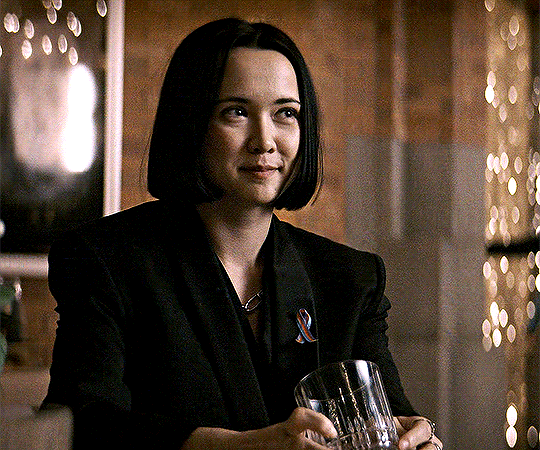
Request: Hii,if your request are still open can i request something for Gen V?Can you write something where Jordan and fem reader are childhood best friends and Jordan had always been in love with her but they feel insecure because they don’t know if reader will like them in both forms romantically?So when,in ep 3,Jordan dad goes like “Y/n and Jordan will be husband and wife” reader goes “Maybe we will be wife and wife”because she loves Jordan just like they are?
AN: Reader wants to be the first supe president (just to explain why they’re at the gala), I changed the timeline of the ep a tiny bit. I have another request about meeting Jordan's parents but that one might be more angsty.
CW: fem!reader, kissing, no beta, Jordan's parents are just their warning. The start is all flashbacks so I may have slipped on the tense a few times, no beta
WC: 2.0K

Jordan Li was your first kiss. Twice. The first time was in kindergarten, when they tried to kiss you and you smacked them with your Queen Mauve lunch box. Your second first kiss (the one you consider your actual first kiss) was done by you while playing truth or dare at 14. After picking a dare, you were asked to kiss the best-looking guy in the group. You shrugged and picked your best friend - Jordan.
At age six, they were there when you broke your ankle trying to see if you could fly (you couldn’t). When you did get powers, they were the first person you told.
When Jordan came out to you as bigender, you did an internet deep-dive, trying to understand as much as possible.
Jordan listened to every interaction you had with your high school crush while quietly dying inside, wanting you to be happy. When your high school boyfriend cheated on you and then dumped you for the girl he cheated with, Jordan was there, ready to sink hours into their Xbox to keep you distracted.
The worst week of your life was when you didn't speak to Jordan for 9 whole days. You got into a petty argument where you called them self-absorbed and they called you clingy. The fight snowballed into yelling arguments and ended with you receiving a cold shoulder from Jordan.
When Jordan got their wisdom teeth removed, you camped out in their room, snuggled under their duvet with them to watch Property Brothers for two days straight. You even made sure they took their painkillers on time and used ice packs.
Every fight with their parents, you were outside in your car ready to pick up Jordan to stay with you. Once you showed up at their house at 6:03 am, eyes blurry with sleep and still in pyjamas. Jordan was crying, bob haircut looked messy from sleep. You drove them to Vought-A-Burger, still half asleep and ate greasy breakfast sandwiches in your car until Jordan stopped crying.
Jordan was even your date to prom, taking photos with you in their masculine form to get their parents off their back. Once their parents were happy, you snuck them back to yours, where you stashed their prom dress.
You both even applied to God U together. Too nervous to check your acceptance, Jordan checked yours and you checked theirs. Sitting across from each other on your bed you both log in before giving the laptops to each other.
“Okay, three, two, one…” you counted down, opening Jordan’s laptop. Your eyes scanned for any promising words like congratulations, or welcome. "Accepted" was the first word your eyes caught but you need to fuck with them.
“Jord… I’m so sorry.” You start. Their face falls, and you feel like a dick for doing this. But the opportunity is too good to pass up. “That you believed me! Because you got in!”
They lunged across your bed to see what the screen says. You saw Jordan's eyes scan the same letter you just read, picking out the same words.
“You’re such an asshole!” they told you, rolling their eyes, gently hitting your arm with the back of their hand
You’ve never been shy about showering Jordan with compliments. Saved in screenshots never to see the light of day, Jordan has kept some of them.
You: OMG!!! Jordan you’re so pretty. I’m so lucky to call you my friend.
You: You’re so handsome!!! I love your hair slicked back! If she doesn’t agree you need to drop her.
You: ur a solid 9/10. Lost a point for not giving me a sip of your drink yesterday lol
Jordan Li has been in love with you since age 16. Probably earlier, if they want to admit that to themselves. You’ve only ever expressed interest in men so they kept their feelings to themselves, not wanting to make you uncomfortable, figuring it was better to have you as a friend only than not at all.

In your first year, you were even roommates. While Jordan flourished in crim, you bounced between majors before settling into politics.
Every time you brought some frat guy to your shared dorm, Jordan died inside. Trying to get over their long-standing crush, Jordan did the same.
When Jordan made number 2 on the top five, you celebrate with them. Maybe a bit too hard that night.
You were there when their ranking dropped after the death of Brink. A man you only met twice, but you would do anything for Jordan. Especially given how hard you fell for both versions of them last year.
“I’m going to try to tag team with your dad, get some points for you and keep him engaged, yeah?” You ask over your shocker. Jordan is behind you, ready to help with zipper duty for your dress.
“You don’t have to.”
You let out a small scoff. “Dude. I’m doing poli supe. Schmoozing with rich people is like half our courses. Zip me up please.”

“How long have you known Jordan? You seem to be a good couple.” The man you and Jordan's dad suckered into a conversation asks. He's sitting beside Jordan's parents, while you and Jordan are on the edge of some fancy pit or table.
“Well, these two have known each other pretty well over the years. Jordan tried to kiss her when they were kids, and she hit him with her Black Noir lunch box.”
“It was a Queen Mauve lunch box, actually.” You say with a laugh.
“And she called him ‘Jojo’ for probably the next two years out of spite.” Kayla laughs. It's a special embarrassment when your parents tell stories about your childhood. All the stories are about you but it's been so long ago you can’t remember any of it. Jordan looks worse off, slouchy posture against the banister, while you sit next to him. Part of you wants to tell him to sit up straight, but you figure you can play the grief angle better this way.
“Oh, and remember when Jordan got his wisdom teeth out? You guys were inseparable. I think I still have the photo of you two passed out watching TV!” Kayla gushes, reaching for her phone to find the photo.
“We all thought you two would be president and First Gentleman.” Dad insists. Your smile is fake and tight, knowing if Paul pulls out prom photos, you would have to quietly fling yourself out of a window.
Maybe you drank a bit too much liquid courage. Maybe the tension between them and their parents was getting to you. To give Jordan some space, you took their parents for a tour of your classes, knowing they’ll be talking to your family when they go back to Rochester.
Jordan shifting doesn’t even cause you to raise an eyebrow, the subtle sound just blurs into the background.
“Or president and First Lady.” You blurt out, four pairs of eyes darting towards you. “First supes in the Whitehouse? It would be political dynamite.”
“You like this version of Jordan?” Dad asks with bewilderment.
“Of course. I like Jordan because of how smart and driven they are. I like Jordan because of their weird sense of humour. It doesn’t matter what they look like.” you say, trying to prove it to their parents, but also to them. You’ve picked up on their crush many times, too kind to say something that would embarrass them or hurt them. It’s only recently how much you found yourself staring at fem Jordan and wanting to kiss her too.
“I’m going to go and mingle some more.” says the man, Brad or Rob maybe. You forgot his name right after you met him. His words are like a bucket of cold water was dumped over you. You don’t confess your feelings to Jordan just to Jordan, but in front of their judgy parents, and a possible donner. You need to go.
You stand and straighten out your dress.
“I’m going to go too. Other donors to talk to. Go Jordan!" You finish with an awkward laugh and even more cringy go team! gesture by yourself.

You didn't lie to Jordan and their parents. You did go and talk to other donors but it twists your stomach every time you bring up how amazing their grades are, or how skillful they are at fighting. After donor number three gives you an answer that technically was “we’ll see” but heavily implied to be "yes for Jordan” you went to hide in the bathroom. You have enough battery left on your V-phone to keep it going for most of the night. Tomorrow you can talk to Jordan and hope you don’t fuck it all up.
You barely look up when the door opens, already have done too much for the day to care who it is.
‘Hey, can we talk?” You snap to attention at the voice. Of course, you know that voice. It's Jordan, still feminine presenting.
“Fuck, Jord, I’m so sorry, I shouldn’t have spring that on you. I promise I’ll just go back and try to get you some votes, you’re going through a lot.” You say, in a rush to get the words out, desperate not to fuck up you’re friendship. The rim of the sink is hard against your back but you can’t help but shrink into it.
“Did you mean it?” They ask, still keeping a distance from you.
“Yeah, of course, I don’t want to ruin this friendship.”
“No, what you said in front of my parents.”
Oh right. Your confession. Fuck. It's already out there, might as well keep it going.
“I may, uh-” you curse yourself for leaving your drink outside the bathroom, wanting something in your hands to stall. “-have a crush. On you. My best friend.” You twist your hands together, wishing Jordan didn’t look so pretty. If your heart beats any faster you may go into cardiac arrest.
It's Jordan that indicates your third first kiss. It's gentle, and fast, like the second one. She pulls back quickly, but you run your fingers through her hair and pull her closer. The intensity from the first first kiss is still there, only this time you both share it. Her hand smooths up to your face, thumb stroking your cheek in a silent invitation to open your mouth. You comply, and tilt your head into her palm. Her tongue sweeps into your mouth and you can taste the champagne they were drinking.
The sound of the door opening makes you both jump.
“Stall?” You ask, voice low and hushed. You squirm out from where she has you between the sink and her. You push the door open to the nicest-looking stall, desperate to keep kissing Jordan. They follow your lead eagerly, one hand wrapped around your shoulder to keep you near.
Dipping their head, they softly kiss your jaw before moving onto your neck. You silently thank the other two women arguing in the bathroom so that your gasp goes unnoticed. Giving Jordan's hair a small tug, you pull them back up to you. The shit-eating grin they flash you makes you want to almost get caught again.
Your free hand moves to their waist, trying to get as close to them as physically possible.
You pull back slightly, wanting so desperately to get lost in the moment, but the commotion in the other stall is distracting. Plus you’re nosey.
Jordan frowns when you pull away, eyes scanning your face for something they did wrong. You shake your head and tip it over to the stall.
“The fuck?” They mouth to you, hand still around your shoulder.
You gently push Jordan against the door to give yourself space to squat down. You see two pairs of feet in the stall across the wall. You hear the voices quiet down, before the sound of someone peeing. You frown slightly, weird fetish to do at a memorial gala but you hear rumours about students into more fucked up shit.
“We should get outta here.” You whisper to Jordan.
“Weird place for our third first kiss.” Jordan whispers back. You reach around them to unlock the stall door. Third first kiss. You replay the words in your head, a warm feeling blooming in your chest.
You gently push them out of the stall, trying to keep your laughs quiet as you both scurry past the other couple in the stall.
#I read it once for spelling and flow then released it to the world#jordan li x reader#jordan li x y/n#jordan li imagine#gen v x reader#gen v x y/n#gen v imagine#whew this got out of hand#time to talk about jordan
2K notes
·
View notes
Text
WoT Meta: Feudalism, Class, And The Politics of The Wheel of Time
One of my long standing personal annoyances with the fantasy genre is that it often falls into the trap of simplifying feudal class systems, stripping out the interesting parts and the nuance to make something that’s either a lot more cardboard cut-out, or has our modern ideas about class imposed onto it.
Ironically the principal exception is also the series that set the bar for me. As is so often the case, Robert Jordan’s Wheel of Time is unique in how much it works to understand and convey a realistic approach to power, politics, government, rulership, and the world in general–colored neither by cynicism or idealism. How Jordan works the feudal system into his world building is no exception–weaving in the weaknesses, the strengths, and the banal realities of what it means to have a Lord or Lady, a sovereign Queen or King, and to exist in a state held together by interpersonal relationships between them–while still conveying themes and ideas that are, at their heart, relevant to our modern world.
So, I thought I’d talk a little bit about how he does that.
Defining the Structure
First, since we’re talking about feudal class systems, let's define what that means– what classes actually existed, how they related to each other, and how that is represented in Jordan’s world.
But before that, a quick disclaimer. To avoid getting too deep into the historical weeds, I am going to be making some pretty wide generalizations. The phrases ‘most often’, ‘usually’, and ‘in general’ are going to be doing a lot of heavy lifting. While the strata I’m describing is broadly true across the majority medieval and early Renaissance feudal states these things were obviously heavily influenced by the culture, religion, geography, and economics of their country–all of which varied widely and could shift dramatically over a surprisingly small amount of time (sometimes less than a single generation). Almost nothing I am going to say is universally applicable to all feudal states, but all states will have large swathes of it true for them, and it will be widely applicable. The other thing I would ask you to keep in mind is that a lot of our conceptions of class have been heavily changed by industrialization. It’s impossible to overstate how completely the steam engine altered the landscape of socio-politics the world over, in ways both good and bad. This is already one of those things that Jordan is incredibly good at remembering, and that most fantasy authors are very good at forgetting.
The disparity between your average medieval monarch’s standard of living and their peasants was pretty wide, but it was nothing compared to the distance between your average minimum wage worker and any billionaire; the monarch and the peasant had far more in common with each other than you or I do with Jeff Bezos or Mike Zuckerberg. The disparity between most people’s local country lord and their peasants was even smaller. It was only when the steam engine made the mass production of consumer goods possible that the wealth gap started to become a chasm–and that was in fact one of the forces that lead to the end of the feudal system and the collapse of many (though by no means all) of the ruling monarchies in Europe. I bring this up because the idea of a class system not predicated on the accumulation of capital seems pretty alien to our modern sensibilities, but it was the norm for most of history. Descent and birth mattered far more than the riches you could acquire–and the act of accumulating wealth was itself often seen as something vulgar and in many countries actively sinful. So with that in mind, what exactly were the classes of feudalism, and how do they connect to the Wheel of Time?
The Monarch and their immediate family unsurprisingly occupied the top of the societal pyramid (at least, in feudal states that had a monarch and royal family- which wasn’t all of them). The Monarch was head of the government and was responsible for administering the nation: collecting taxes, seeing them spent, enforcing law, defending the country’s borders and vassals in the event of war, etc. Contrary to popular belief, relatively few monarchs had absolute power during the medieval period. But how much power the monarch did have varied widely- some monarchs were little more than figureheads, others were able to centralize enough power on themselves to dictate the majority of state business- and that balance could shift back and forth over a single generation, or even a single reign depending on the competence of the monarch.
The royal family usually held power in relation to their monarch, but also at the monarch’s discretion. The more power a monarch had, the more likely they were to delegate it to trusted family members in order to aid with the administration of the realm. This was in both official and unofficial capacities: princes were often required to do military service as a right of passage, and to act as diplomats or officials, and princesses (especially those married into foreign powers) were often used as spies for their home state, or played roles in managing court affairs and business on behalf of the ruler.
Beneath the monarch and their family you get the noble aristocracy, and I could write a whole separate essay just on the delineations and strata within this group, but suffice to say the aristocracy covers individuals and families with a wide range of power and wealth. Again, starting from that country lord whose power and wealth in the grand scheme of things is not much bigger than his peasants, all the way to people as powerful, or sometimes more powerful, than the monarch.
Nobles in a feudal system ruled over sections of land (the size and quality usually related sharply to their power) setting taxes, enforcing laws, providing protection to the peasants, hearing petitions, etc. within their domains. These nobles were sometimes independent, but more often would swear fealty to more powerful nobles (or monarchs) in exchange for greater protection and membership in a nation state. Doing so meant agreeing to pay taxes, obey (and enforce) the laws of the kingdom, and to provide soldiers to their liege in the event of war. The amount of actual power and autonomy nobles had varied pretty widely, and the general rule of thumb is that the more powerful the monarch is, the less power and autonomy the nobles have, and vice versa. Nobles generally were expected to be well educated (or at least to be able to pretend they were) and usually provided the pool from which important government officials were drawn–generals, council members, envoys, etc–with some kingdoms having laws that prevented anyone not of noble descent from occupying these positions.
Beneath the nobles you get the wealthy financial class–major merchants, bankers, and the heads of large trade guilds. Those Marx referred to generally as the bourgeoisie because they either own means of production or manage capital. In a feudal system this class tended to have a good bit of soft power, since their fortunes could buy them access to circles of the powerful, but very little institutional power, since the accumulation and pursuit of riches, if anything, was seen to have negative moral worth. An underlying presumption of greediness was attached to this class, and with it the sense that they should be kept out of direct power.
That was possible, in part, because there weren't that many means of production to actually own, or that much capital to manage, in a pre-industrial society. Most goods were produced without the aid of equipment that required significant capital investment (a weaver owned their own loom, a blacksmith owned their own tools, etc), and most citizens did not have enough wealth to make use of banking services. This is the class of merchants who owned, but generally didn’t directly operate, multiple trading ships or caravans, guild leaders for craftsfolk who required large scale equipment to do their work (copper and iron foundries for the making of bells, for example), and bankers who mainly served the nobility and other wealthy individuals through the loaning and borrowing of money. This usually (but not always) represented the ceiling of what those not born aristocrats could achieve in society.
After that you get middling merchants, master craftsfolk and specialty artisans, in particular of luxury goods. Merchants in this class usually still directly manage their expeditions and operations, while the craftsfolk and artisans are those with specialty skill sets that can not be easily replicated without a lifetime of training. Master silversmiths, dressmakers, lacquer workers, hairdressers, and clockmakers are all found in this class. How much social clout individuals in this class have usually relates strongly to how much value is placed on their skill or product by their society (think how the Seanchan have an insatiable appetite for lacquer work and how Seanchan nobles make several Ebou Dari lacquer workers very rich) as well as the actual quality of the product. But even an unskilled artisan is still probably comfortable (as Thom says, even a bad clockmaker is still a wealthy man). Apprenticeships, where children are taught these crafts, are thus highly desired by those in lower classes,as it guaranteed at least some level of financial security in life.
Bellow that class you find minor merchants (single ship or wagon types), the owners of small businesses (inns, taverns, millers etc), some educated posts (clerks, scribes, accountants, tutors) and most craftsfolk (blacksmiths, carpenters, bootmakers, etc). These are people who can usually support themselves and their families through their own labor, or who, in the words of Jin Di, ‘work with their hands’. Most of those who occupy this class are found in cities and larger towns, where the flow of trade allows so many non-food producers to congregate and still (mostly) make ends meet. This is why there is only one inn, one miller, one blacksmith (with a single apprentice) in places like Emond’s Field: most smaller villages can not sustain more than a handful of non-food producers. This is also where you start to get the possibility of serious financial instability; in times of chaos it is people at this tier (and below) that are the first to be forced into poverty, flight, or other desperate actions to survive.
Finally, there is the group often collectively called ‘peasants’ (though that term is also sometimes used to mean anyone not noble born). Farmers, manual laborers, peddlers, fishers- anyone who is unlikely to be able to support more than themselves with their labor, and often had to depend on the combined labor of their spouse and families to get by. Servants also generally fit into this tier socially, but it’s important to understand that a servant in say, a palace, is going to be significantly better paid and respected than a maid in a merchant's house. This class is the largest, making up the majority of the population in a given country, and with a majority of its own number being food-producers specifically. Without the aid of the steam engine, most of a country’s populace needs to be producing food, and a great deal of it, in order to remain a functional nation. Most of the population as a result live in smaller spread out agrarian communities, loosely organized around single towns and villages. Since these communities will almost always lack access to certain goods or amenities (Emond’s Field has a bootmaker, but no candlemaker, for example) they depend on smalltime traders, called peddlers, to provide them with everyday things, who might travel from town to town with no more than a single wagon, or even just a large pack.
The only groups lower than peasants on the social hierarchy are beggars, the destitute, and (in societies that practice slavery) slaves. People who can not (or are not allowed to) support themselves, and instead must either eke out a day to day existence from scraps, or must be supported by others. Slaves can perform labor of any kind, but they are regarded legally as a means of production rather than a laborer, and the value is awarded to their owner instead.
It’s also worth noting that slavery has varied wildly across history in how exactly it was carried out and ran the gamut from the trans-Atlantic chattel slavery to more caste or punitive-based slavery systems where slaves could achieve freedom, social mobility, or even some degree of power within their societies. But those realities (as with servants) had more to do with who their owners were than the slave’s own merit, and the majority of slaves (who are almost always seen as less than a freedman even when they are doing the same work) were performing the same common labor as the ‘peasant’ class, and so viewed as inferior.
Viewing The Wheel of Time Through This Lens
So what does all this have to do with Robert Jordan’s Wheel of Time? A lot actually, especially compared to his contemporaries in fantasy writing. Whereas most fantasy taking place in feudal systems succumbs to the urge to simplify matters (sometimes as far down to their only being two classes, ‘peasant’ and ‘royalty’) Jordan much more closely models real feudalism in his world.
The majority of the nations we encounter are feudal monarchies, and a majority of each of their populations are agrarian farming communities overseen by a local lord or other official. How large a nation’s other classes are is directly tied to how prosperous the kingdom is, which is strongly connected to how much food and how many goods the kingdom can produce on the available land within it. This in turn, is tightly interdependent on how stable the kingdom is and how effective its government is.
Andor is the prime example: a very large, very prosperous kingdom, which is both self-sufficient in feeding itself via its large swathes of farmland (so much so that they can afford to feed Cairhien through selling their surplus almost certainly at next to no profit) and rich in mineral wealth from mines in the west. It is capable of supporting several fairly large cities even on its outskirts, as well as the very well-developed and cosmopolitan Caemlyn as its capital. This allows Andor to maintain a pretty robust class of educated workers, craftsfolk, artisans, etc, which in turn furthers the realm’s prosperity. At the top of things, the Queen presides over the entire realm with largely centralized power to set laws and taxes. Beneath her are the ‘great houses’–the only Houses in Andor besides the royal house who are strong enough that other nobles ‘follow where they lead’ making them the equivalent of Duchesses and Dukes, with any minor nobles not sworn directly to the Queen being sworn to these ten.
And that ties into something very important about the feudal system and the impact it had on our world and the impact it has on Jordan's. To quote Youtuber Jack Rackham, feudalism is what those in the science biz would call an unstable equilibrium. The monarch and their vassals are constantly in conflict with each other; the vassals desiring more power and autonomy, as the monarch works to centralize power on themselves. In feudalism there isn’t really a state army. Instead the monarch and the nobles all have personal armies, and while the monarch’s might be stronger than anyone else’s army, it’s never going to be stronger than everybody else’s.
To maintain peace and stability in this situation everyone has to essentially play Game of Thrones (or as Jordan called it years before Martin wrote GoT, Daes Dae’mar) using political maneuvering, alliances, and scheming in order to pursue their goals without the swords coming out, and depending on the relative skill of those involved, this can go on for centuries at a time….or break apart completely over the course of a single bad summer, and plunge the country into civil war.
Cairhien is a great example of this problem. After losing the Aiel War and being left in ruins, the monarch who ultimately secured the throne of Cairhien, Galldrian Riatin, started from a place of profound weakness. He inherited a bankrupt, war torn and starving country, parts of which were still actively on fire at the time. As Thom discusses in the Great Hunt, Galddrian's failure to resettle the farmers displaced by the war left Cairhien dependent on foreign powers to feed the populace (the grain exports from Tear and Andor) and in order to prevent riots in his own capital, Galldrian choose bread and circuses to keep the people pacified rather then trying to substantially improve their situation. Meanwhile, the nobles, with no effective check on them, began to flex their power, seeing how much strength they could take away from each other and the King, further limiting the throne’s options in how to deal with the crisis, and forcing the King to compete with his most powerful vassals in order to just stay on the throne. This state of affairs ultimately resulted, unsurprisingly, in one of Galladrin’s schemes backfiring, him ending up dead, and the country plunging into civil war, every aristocrat fighting to replace him and more concerned with securing their own power then with restoring the country that was now fully plunged into ruin.
When Dyelin is supporting Elayne in the Andoran Succession, it is this outcome (or one very much like it) that she is attempting to prevent. She says as much outright to Elayne in Knife of Dreams–a direct succession is more stable, and should only be prevented in a situation where the Daughter Heir is unfit–through either incompetence or malice–to become Queen. On the flip side, Arymilla and her lot are trying to push their own agendas, using the war as an excuse to further enrich their Houses or empower themselves and their allies. Rhavin’s machinations had very neatly destabilized Andor, emboldening nobles such as Arymilla (who normally would never dream of putting forward a serious claim for the throne) by making them believe Morgase and Trakand were weak and thus easy to take advantage of.
We also see this conflict crop up as a central reason Murandy and Altara are in their current state as well. Both are countries where their noble classes have almost complete autonomy, and the monarch is a figurehead without significantly more power than their vassals (Tylin can only keep order in Ebou Dar and its immediate surrounding area, and from what she says her father started with an even worse deal,with parts of the capital more under the control of his vassals than him). Their main unifying force is that they wish to avoid invasion and domination by another larger power (Andor for Murandy, Illian and Amadica for Altara) and the threat of that is the only thing capable of bringing either country into anything close to unity.
Meanwhile a lack of centralization has its trade offs; people enjoy more relative freedoms and social mobility (both depend heavily on trade, which means more wealth flowing into their countries but not necessarily accumulating at the top, due to the lack of stability), and Altara specifically has a very robust ‘middle class’ (or as near as you can get pre-industrialization) of middling to minor merchants, business and craftsfolk, etc. Mat’s time in Ebou Dar (and his friendship with Satelle Anan) gets into a lot of this. Think of the many many guilds that call Altara home, and how the husband of an inn owner can do a successful enough business fishing that he comes to own several crafts by his own merit.
On the flip side both countries have problems with violence and lawlessness due to the lack of any enforced uniformity in terms of justice. You might ride a day and end up in land ruled by a Lord or Lady with a completely different idea of what constitutes, say, a capital offense, than the Lord or Lady you were under yesterday. This is also probably why Altara has such an ingrained culture of duels to resolve disputes, among both nobles and common folk. Why appeal to a higher authority when that authority can barely keep the streets clean? Instead you and the person you are in conflict with, on anything from the last cup of wine to who cheated who in a business deal, can just settle it with your knives and not have to bother with a hearing or a petition. It’s not like you could trust it anyways; as Mat informs us, most of the magistrates in Altara do the bidding of whoever is paying their bribes.
But neither Altara nor Murandy represents the extreme of how much power and autonomy nobles can manage to wrangle for themselves. That honor goes to Tear, where the nobles have done away with the monarch entirely to instead establish what amounts to an aristocratic confederacy. Their ruling council (The High Lords of Tear) share power roughly equally among themselves, and rule via compromise and consensus. This approach also has its tradeoffs: unlike Murandy and Altara, Tear is still able to effectively administer the realm and create uniformity even without a monarch, and they are able to be remarkably flexible in terms of their politics and foreign policy, maintaining trade relationships even with bitter enemies like Tar Valon or Illian. On the flipside, the interests of individual nobles are able to shape policy and law to a much greater extent, with no monarch to play arbiter or hold them accountable. This is the source of many of the social problems in Tear: a higher sense of justice, good, or even just plain fairness all take a back seat to the whims and interest of nobles. Tear is the only country where Jordan goes out of his way, repeatedly, to point out wealth inequality and injustice. They are present in other countries, but Jordan drives home that it is much worse in Tear, and much more obscene.
This is at least in part because there is no one to serve as a check to the nobles, not even each other. A monarch is (at least in theory) beholden to the country as a whole, but each High Lord is beholden only to their specific people, house and interests, and there is no force present that can even attempt to keep the ambitions and desires of the High Lords from dictating everything. So while Satelle Anan's husband can work his way up from a single fishing boat to the owner of multiple vessels, most fisherman and farmers in Tear scrape by on subsistence, as taxes are used to siphon off their wealth and enrich the High Lords. While in Andor ‘even the Queen most obey the law she makes or there is no law’ (to quote Morgase), Tairen Lords can commit murder, rape, or theft without any expectation of consequences, because the law dosen’t treat those acts as crimes when done to their ‘lessers’, and any chance someone might get their own justice back (as they would in Altara) is quashed, since the common folk are not even allowed to own weapons in Tear. As we’re told in the Dragon Reborn, when an innkeeper is troubled by a Lord cheating at dice in the common room, the Civil Watch will do nothing about it and citizens in Tear are banned from owning weapons so there is nothing he can do about it. The best that can be hoped for is that he will ‘get bored and go away’.
On the opposite end, you have the very very centralized Seanchan Empire as a counter example to Tear, so centralized it’s almost (though not quite) managed to transcend feudalism. In Seanchan the aristocratic class has largely been neutered by the monarchy, their ambitions and plots kept in check by a secret police (the Seekers of Truth) and their private armies dwarfed by a state army that is rigorously kept and maintained. It’s likely that the levies of the noble houses, if they all united together, would still be enough to topple the Empress, but the Crystal Throne expends a great deal of effort to ensure that doesn't happen,playing the nobles against each other and taking advantage of natural divisions in order to keep them from uniting.
Again, this has pros and cons. The Seanchan Empire is unquestionably prosperous; able to support a ridiculous food surplus and the accompanying flow of wealth throughout its society, and it has a level of equity in its legal administration that we don’t see anywhere else in Randland. Mat spots the heads of at least two Seanchan nobles decorating the gates over Ebou Dar when he enters, their crimes being rape and theft, which is a far cry from the consequence-free lives of the Tairen nobles. Meanwhile a vast state-sponsored bureaucracy works to oversee the distribution of resources and effective governance in the Empress’s name. No one, Tuon tells us proudly, has to beg or go hungry in the Empire. But that is not without cost.
Because for all its prosperity, Seanchan society is also incredibly rigid and controlling. One of the guiding philosophies of the Seanchan is ‘the pattern has a place for everything and everything’s place should be obvious on sight’. The classes are more distinct and more regimented than anywhere else we see in Randland. The freedoms and rights of everyone from High Lords to common folk are curtailed–and what you can say or do is sharply limited by both social convention and law. The Throne (and its proxies) are also permitted to deprive you of those rights on nothing more than suspicion. To paraphrase Egeanin from TSR: Disobeying a Seeker (and presumably any other proxy of the Empress) is a crime. Flight from a Seeker is a crime. Failure to cooperate fully with a Seeker is a crime. A Seeker could order a suspected criminal to go fetch the rope for their own binding, and the suspected criminal would be expected to do it–and likely would because failure to do anything else would make them a criminal anyway, whatever their guilt or innocence in any other matter.
Meanwhile that food surplus and the resulting wealth of the Empire is built on its imperialism and its caste-based slavery system, and both of those are inherently unsustainable engines. What social mobility there is, is tied to the Empire’s constant cycle of expand, consolidate, assimilate, repeat–Egeanin raises that very point early on, that the Corenne would mean ‘new names given and the chance to rise high’. But that cycle also creates an endless slew of problems and burning resentments, as conquered populations resist assimilation, the resistance explodes into violence that the Seanchan must constantly deal with–the ‘near constant rebellions since the Conquest finished’ that Mat mentions when musing on how the Seanchan army has stayed sharp.
The Seanchan also practice a form of punitive and caste-based slavery for non-channelers, and chattel slavery for channelers. As with the real-life Ottoman Empire, some da’covale enjoy incredible power and privilege in their society, but they (the Deathwatch Guard, the so’jhin, the Seekers) are the exception, not the rule. The majority of the slaves we encounter are nameless servants, laborers, or damane. While non-channelers have some enshrined legal protections in how they can be treated by their masters and society as a whole, we are told that emancipation is incredibly rare, and the slave status is inherited from parent to child as well as used as a legal punishment–which of course would have the natural effect of discouraging most da’covale from reproducing by choice until after (or if) they are emancipated–so the primary source for most of the laborers and servants in Seanchan society is going to be either people who are being punished or who choose to sell themselves into slavery rather then beg or face other desperate circumstances.
This keeps the enslaved population in proportion with the rest of society only because of the Empire’s imperialism- that same cycle of expand, consolidate, assimilate, repeat, has the side effect of breeding instability, which breeds desperation and thus provides a wide pool to draw on of both those willing to go into slavery to avoid starvation, and those who are being punished with slavery for wronging the state in some manner. It’s likely the only reason the Empire’s production can keep pace with its constant war efforts: conquered nations (and subdued rebellions) eventually yield up not just the necessary resources, but also the necessary laborers to cultivate them in the name of the state, and if that engine stalls for any sustained length of time (like say a three hundred year peace enforced by a treaty), it would mean a labor collapse the likes of which the Empire has never seen before.
A note on damane here: the damane system is undoubtedly one of chattel slavery, where human beings are deprived of basic rights and person hood under the law for the enrichment of those that claim ownership over them. Like in real life this state of affairs is maintained by a set of ingrained cultural prejudices, carefully constructed lies, and simple ignorance of the truly horrific state of affairs that the masses enjoy. The longevity of channelers insulates the damane from some of the problems of how slavery can be unsustainable, but in the long run it also suffers from the same structural problem: when the endless expansion stops, so too will the flow of new damane, and the resulting cratering of power the Empire will face will put it in jeopardy like nothing has before. There is also the problem that, as with real life chattel slavery, if any one piece of the combination of ignorance, lies, and prejudice starts to fall apart, an abolition movement becomes inevitable–and several characters are setting the stage for just that via the careful spreading of the truth about the sul’dam. Even if the Seanchan successfully put down an abolition movement, doing so will profoundly weaken them in a way that will necessitate fundamental transformation, or ensure collapse.
How Jordan Depicts The Relationships Between Classes
As someone who is very conscious in how he depicts class in his works, it makes sense that Jordan frequently focuses on characters interacting through the barriers of their various classes in different ways. New Spring in particular is a gold mine for this kind of insight.
Take, for example, Moiraine and Siuan’s visit to the master seamstress. A lesser writer would not think more deeply on the matter than ‘Moiraine is nobly born so obviously she’s going to be snobby and demanding, while down-to-earth Siuan is likely to be build a natural rapport and have better relationship her fellow commoner, the seamstress Tamore Alkohima’. But Jordan correctly writes it as the reverse: Tamore Alkohima might not be nobly born, but she is not really a peasant either–rather she belongs to that class of speciality artisans, who via the value placed on her labor and skill, is able to live quite comfortably. Moiraine is much more adept at maneuvering this kind of possibly fraught relationship than Siuan is. Yes, she is at the top of the social structure (all the more so since becoming Aes Sedai) but that does not release her from a need to observe formalities and courtesies with someone who, afterall, is doing something for Moiraine that she can not do for herself, even with the Power. If Moiraine wants the services of a master dressmaker, the finest in Tar Valon, she must show respect for both Tamore Alkohima and her craft, which means submitting to her artistic decisions, as well as paying whatever price, without complaint.
Siuan, who comes from the poor Maule district in Tear, is not used to navigating this kind of situation. Most of those she has dealt with before coming to the Tower were either her equals or only slightly above her in terms of class. She tries to treat Tamore Alkohima initially like she most likely treated vendors in the Maule where everyone is concerned with price, since so many are constantly on the edge of poverty, and she wants to know exactly what she is buying and have complete say over the final product, which is the practical mentality of someone to whom those factors had a huge impact on her survival. Coin wasted on fish a day from going bad, or netting that isn’t the right kind, might have meant the difference between eating that week or not, for a young Siuan and her father.
Yet this this reads as an insult to Tamore Alkohima, who takes it as being treated with mockery, and leads to Moiraine needing to step in to try and smooth things over, and explain to Siuan-
“Listen to me, Siuan and do not argue.” she whispered in a rush. “We must not keep Tamore waiting long. Do not ask after prices: she will tell us after we make our selections. Nothing you buy here will be cheap, but the dresses Tamore sews for you will make you look Aes Sedai as much as the shawl does. And it is Tamore, not Mistress Alkohima. You must observe the properties or she will believe you are mocking her. But try thinking of her as a sister who stands just a little above you. A touch of deference is necessary. Just a touch, but she will tell you what to wear as much as she asks.” “And will the bloody shoe maker tell us what kind of slippers to buy and charge us enough to buy fifty new sets of nets?” “No.” Moiraine said impatiently. Tamore was only arching one eyebrow but her face may as well have been a thunderhead. The meaning of that eyebrow was clear as the finest crystal. They had already made the seamstress wait too long, and there was going to be a price for it. And that scowl! She hurried on, whispering as fast as she could. “The shoemaker will make us what we want and we will bargain the price with him, but not too hard if we want his best work. The same with the glovemaker, the stockingmaker, the shiftmaker, and all the rest. Just be glad neither of us needs a hairdresser. The best hairdressers are true tyrants, and nearly as bad as perfumers.”
-New Spring, Chapter 13: Business in the City.
Navigating the relationship between characters of a different class is something a of a running theme throughout New Spring–from Moiraine’s dealing with the discretion of her banker (‘Another woman who knew well her place in the world’ as Moiraine puts it), to having to meet with peasants during her search for the Dragon Reborn (and bungling several of those interactions), to wading through the roughest criminal parts of Chachin in search of an inn, and frequently needing to resort to the Power to avoid or resolve conflict. Moiraine’s ability to handle these situations is tightly tied to her experience with the people involved prior to her time as a Novice, but all hold up and give color to the class system Jordan presents. It also serves as set up so that when Moraine breaks the properties with a different seamstress near the end of the book, it can be a sign of the rising tension and the complex machinations she and Siuan find themselves in.
Notably, Moiraine and Siuan’s relative skill with working with people is strongly related to their backgrounds: the more Moiraine encounters people outside her lived experience as a noble daughter in Cairhien, the more she struggles to navigate those situations while Siuan is much more effective at dealing with the soldiers during the name-taking sequence (who are drawn mostly from the same class as her–common laborers, farmers, etc), and the people in Chachin, where she secures an lodging and local contacts to help in the search with relative ease.
Trying to navigate these waters is also something that frequently trips up characters in the main series as well, especially with the Two Rivers folk who are, ultimately, from a relatively classless society that does not subscribe to feudal norms (more on that below). All of them react to both moving through a society that does follow those norms, and later, being incorporated into its power structures in different, frequently disastrous ways.
Rand, who is not used to the complicated balance between vassal and monarch (which is all the more complicated as he is constantly adding more and more realms under his banner) finds imposing his will and leading the aristocrats who swear fealty to him incredibly difficult. While his reforms are undoubtedly good for the common folk and the general welfare of the nations he takes over, he is most often left to enforce them with threats and violence, which ultimately fuel resistance, rebellion, and more opposition to him throughout the nations he rules, and has down-the-line bad ripple effects on how he treats others, both noble and not, who disagree with him.
Rand also struggles even with those who sincerely wish to serve and aid him in this context: he is awkward with servants, distant with the soldiers and warriors who swear their lives to him, and even struggles with many of his advisors and allies. Part of that is distrust that plagues him in general, but a big element to it is also his own outsider perspective. The Aiel frequently complain that Rand tries to lead them like a King, but that’s because they assume a wetlander King always leads by edict and command. Yet Rand’s efforts to do that with the Westland nations he takes over almost always backfire or have lasting consequences. Rand is frequently trying to frequently play act at what he thinks a King is and does–and when he succeeds it’s almost always a result of Moiraine or Elayne’s advice on the subject, not his own instincts or preconceptions.
Perrin, meanwhile, is unable to hide his contempt for aristocracy and those that willingly follow them, which leads to him both being frequently derelict in his duties as a Lord, and not treating his followers with a great deal of respect. Nynaeve has a similar problem, where she often tries to ‘instill backbone’ into those lower in the class system then her, then comes to regret it when that backbone ends up turned on her, and her leadership rejected or her position disrespected by those she had encouraged to reject leadership or not show respect to people in higher positions.
Interestingly, it’s Mat that most effectively manages to navigate various inter-class relationships, and who via the Band of the Red Hand builds a pretty equitable, merit-based army. He does this by following a simple rule: treating people how they wish to be treated. He accepts deference when it’s offered, but never demands it. He pushes back on the notion he’s a Lord often, but only makes it a serious bone with people who hold the aristocracy in contempt. He’s earnest in his dealings, fair minded, and good at reading social situations to adapt to how folks expect him to act, and when he breaches those expectations it’s usually a deliberate tactical choice.
This lets him maintain strong friendships with people of all backgrounds and classes– from Princes like Beslan to horse thieves like Chel Vanin. More importantly, it makes everyone under his command feel included, respected, and valued for what they are. Mat has Strong Ideas About Class (and about most things really), but he’s the only Two Rivers character who doesn't seem to be working from an assumption that everyone else ought to live by his ideals. He thinks anyone that buys into the feudal system is mad, but he doesn't actually let that impact how he treats anyone–probably from the knowledge that they think he’s just as mad.
Getting Creative With the Structure
The other thing I want to dig into is the ways in which Jordan, via his understanding of the feudal system, is able to play with it in creative and interesting ways that match his world. Succession is the big one; who rules after the current monarch dies is a massively important matter since it determines the flow of power in a country from one leader to the next. The reason so many European monarchies had primogeniture (eldest child inherits all titles) succession is not because everyone just hated second children, it’s because primogeniture is remarkably stable. Being able to point to the eldest child of the monarch and say them, that one, and their younger sibling if they're not around, and so on is very good for the transition of power, since it establishes a framework that is both easy to understand and very very hard to subvert. Pretty much the only way, historically, to subvert a primogeniture succession is for either the heir’s blood relationship to the monarch or the legitimacy of their parent’s marriage to be called into question.
And yet despite that, few of the countries in Jordan's world actually use primogeniture succession. Andor does, as do some of the Borderlands, but the majority of monarchies in Randland use elective succession, where the monarch is elected from among the aristocratic class by some kind of deliberative body. This is the way things are in Tarabon, Arad Doman,Ghealdan, Illian, and Malkier, who all elect the monarchs (or diarchs in the case of Tarabon- where two rulers, the Panarch and the King, share power) via either special council or some other assembly of aristocrats.
There are three countries where we don’t know the succession type (Arafel, Murandy, and Amadicia) but also one we know for sure doesn't use primogeniture succession: Cairhien. We know this because Moiraine’s claim to the Sun Throne as a member of House Damodred is seen as as legitimate enough for the White Tower to view putting her on the Sun Throne as a viable possibility, despite the fact that she has two older sisters whose claims would be considered superior to her own under primogeniture succession. We never find out for sure in the books what the succession law actually is (the country never stabilizes for a long enough period that it becomes important), but if I had to guess I would guess that it’s designated,where the monarch chooses their successor prior to their death, and that the civil war that followed the Aiel War was the result of both Laman and his designated heir(s) dying at the Bloodsnows (we are told by Moiraine that Laman and both his brothers are killed; likely one of them was the next in line).
One country that we know for sure uses designated succession is Seanchan, where the prospective heir is still chosen from among the children of the Empress, but they are made to compete with each other (usually via murder and plotting) for the monarch’s favor, the ‘best’ being then chosen to become the heir. This very closely models how the Ottoman Empire did succession (state sanctioned fratricide) and while it has the potential to ensure competence (by certain metrics, anyways) it also sows the seeds of potential instability by ensuring that the monarch is surrounded by a whole lot of people with bad will to them and feelings of being cheated or snubbed in the succession, or else out for vengeance for their favored and felled candidate. Of course, from the Seanchan’s point of view this is a feature not a bug: if you can’t win a civil war or prevent yourself from being assassinated, then you shouldn’t have the throne anyways.
Succession is far from the only way that Jordan plays with the feudal structure either. Population is something else that is very present in the world building, even though it’s only drawn attention to a handful of times. In our world, the global population steadily and consistently rose throughout the middle ages and the Renaissance (with only small dips for things like the plague and the Mongol Invasion), then exploded with the Industrial Revolution and has seen been on a meteoric climb year over year (something that may just now be stabilizing into an equilibrium again, only time will tell). This is one of the pressures that led to the collapse of feudalism in the real world, as a growing aristocratic class was confronted with finite land and titles, while at the same time the growing (and increasingly powerful) wealthy financial class of various countries were beginning to challenge the traditions and laws that kept them out of direct power. If you’ve ever read a Jane Austen novel (or really anything from the Georgian/Regency/Victorian eras) this tension is on display. The aristocratic class had never been as secure as people think, but the potential to fall into poverty and ruin had never been a greater threat, which had ripple effects for the stability of a nation, and in particular a monarch who derived much of their power from the fealty of their now-destabilized vassals.
In Jordan’s world however, we are told as early as The Great Hunt that the global population is steadily falling, and has been since the Hundred Years’ War (at least). No kingdom is able to actually control all the territory it has on a map, the size of armies have in particular shrunk consistently (to the point where it’s repeatedly commented on that the armies Rand puts together, some of no more than a few thousand, are larger than any ‘since Artur Hawkwing's day’), large swathes of land lay ungoverned and even more uninhabited or settled. Entire kingdoms have collapsed due to the inability of their increasingly small populations to hold together. This is the fate of many of the kingdoms Ingtar talks about in the Great Hunt: Almoth, Gabon, Hardan, Moredo, Caralain, to name just a few. They came apart due to a combination of ineffective leadership, low population, and a lack of strong neighbors willing or able to extend their power and stability over the area.
All of this means that there is actually more land than there are aristocrats to govern it; so much so that in places like Baerlon power is held by a crown-appointed governor because no noble house has been able to effectively entrench in the area. This has several interesting effects on the society and politics of Randland: people in general are far more aware of the fragility of the nation state as a idea then they would be otherwise, and institutions (even the intractable and mysterious White Tower) are not viewed by even their biggest partisans as invulnerable or perpetual. Even the most powerful leaders are aware, gazing out constantly, as they do, at the ruins of the hundreds of kingdoms that have risen and fallen since the Breaking of the World (itself nothing more, to their understanding, then the death of the ultimate kingdom) that there are no guarantees, no promises that it all won’t fall apart.
This conflict reflects on different characters in different ways, drawing out selfishness and cowardice from some, courage and strength from others. This is a factor in Andor’s surprisingly egalitarian social climate: Elayne and Morgase both boast that Andorans are able to speak their minds freely to their leaders about the state of things, and be listened to, and even the most selfish of leaders like Elenia Sarand are painfully aware that they stand on a tower built from ‘the bricks of the common folk’, and make a concentrated effort to ensure their followers feel included and heard. Conversely it also reflects on the extremely regimented culture of the Borderlands, were dereliction of duty can mean not just the loss of your life, but the loss of a village, a town, a city, to Trolloc raids (another pressure likely responsible for slow and steady decline of the global population).
The Borderlanders value duty, honor, and responsibility above all else, because those are the cornerstones holding their various nations together against both the march of time and the Blight. All classes place a high value on the social contract; the idea that everyone must fulfill their duty to keep society safe is a lot less abstract when the stakes are made obvious every winter through monsters raiding your towns. This is most obvious in both Hurin and Ingtar’s behavior throughout The Great Hunt: Hurin (and the rest of the non-noble class) lean on the assurance that the noble class will be responsible for the greater scale problems and issues in order to endure otherwise unendurable realities, and that Rand, Ingtar, Aglemar, Lan (all of whom he believes to be nobly born) have been raised with the necessary training and tools to take charge and lead others through impossible situations and are giving over their entire lives in service to the people. In exchange Hurin pays in respect, obedience, and (presumably) taxes. This frees Hurin up to focus on the things that are decidedly within his ken: tracking, thief taking, sword breaking, etc, trusting that Ingtar, and later Rand, will take care of everything else.
When Hurin comes up against the feudal system in Cairhien, where the failures of everyone involved have lead to a culture of endless backstabbing and scheming, forced deference, entitlement, and mutual contempt between the parties, he at first attempts to show the Cairhienin ‘proper’ behavior through example, in the hopes of drawing out some shame in them. But upon realizing that no one in Cairhien truly believes in the system any longer after it has failed the country so thoroughly (hence the willingness of vassals to betray their masters, and nobles to abandon their oaths–something unthinkable in the Borderlands) he reverts to his more normal shows of deference to Rand and Ingtar, abandoning excessive courtesy in favor of true fealty.
Ingtar (and later Rand) feel the reverse side of this: the pressure to be the one with the answers, to hold it all together, to be as much icon and object as living person, a figure who people can believe in and draw strength from when they have none of their own remaining, and knowing at the same time that their choices will decide the fates and lives of others. It’s no mistake that Rand first meets Hurin and begins this arc in the remains of Hardan, one of those swept-away nations that Ingtar talks about having been left nothing more than ‘the greatest stone quarry for a hundred miles’. The stakes of what can happen if they fail in this duty are made painfully clear from the start, and for Rand the stakes will only grow ever higher throughout the course of the series, as number of those ‘under his charge’ slides to become ‘a nation’ then ‘several nations’ and finally ‘all the world’. And that leads into one of the problems at the heart of Rand’s character arc.
This emphasis on the feudal contract and duty helps the Borderlands survive the impossible, but almost all of them (with the exception of Saldaea) practice cultures of emotional repression and control,spurning displays of emotion as a lack of self-control, and viewing it as weakness to address the pains and psychological traumas of their day to day lives. ‘Duty is heavier than a mountain, death lighter than a feather’, ‘There will be time to sleep when you’re dead’, ‘You can care for the living or mourn the dead, you cannot do both’: all common sayings in the Borderlands. On the one hand, all of these emphasize the importance of fulfilling your duty and obligations…but on the other, all also implicitly imply the only true release from the sorrows and wounds taken in the course of that duty is death. It is this, in part, that breaks Ingtar: the belief that only the Borderlands truly understand the existential threat, and that he and those like him are suffering and dying for ‘soft southlanders’ whose kingdoms are destined to go to ruin anyways. It’s also why he reveals his suffering to Rand only after he has decided to die in a last stand–he is putting down the mountain of his trauma at last. This is also one of those moments in the books that is a particular building block on the road to Rand’s own problems with not expressing his feelings or being willing to work through his trauma, that will swing back around to endanger the same world he is duty-bound to protect.
I also suspect strongly that this is the source of the otherwise baffling Saldean practice of….what we will call dedicated emotional release. One of the core cultural Saldean traits (and something that is constantly tripping up Perrin in his interactions with Faile) is that Saldeans are the only Borderlanders to reject the notion that showing emotion is weakness. In fact, Saldeans in general believe that shows of anger, passion, sorrow, ardor–you name it–are a sign of both strength and respect. Your feelings are strong and they matter, and being willing to inflict them on another person is not a burden or a betrayal of duty, it’s knowing that they will be strong enough to bear whatever you are feeling. I would hesitate to call even the Saldaens well-adjusted (I don’t know that there is a way to be well-adjusted in a society at constant war), but I do think there is merit to their apparent belief in catharsis, and their resistance to emotional repression as a sign of strength. Of course, that doesn't make their culture naturally better at communication (as Faile and Perrin’s relationship problems prove) but I do think it plays a part in why Bashere is such a good influence on Rand, helping push him away from a lot of the stoic restraint Rand has internalized from Lan, Ingtar, Moiraine, et al.
It also demonstrates that a functioning feudal society is not dependent on absolute emotional repression, or perfect obedience. Only mutual respect and trust between the parties are necessary–trust that the noble (or monarch) will do their best in the execution of their duties, and trust that the common folk in society will in turn fulfill their roles to the best of their ability. Faile’s effectiveness as Perrin’s co-leader/second in command is never hindered or even implied to be hindered by her temperament or her refusal to hide/repress her emotions. She is arguably the one who is doing most of the actual work of governing the Two Rivers after she and Perrin are acclaimed their lord and lady: seeing to public works projects, settling disputes, maintaining relationships with various official groups of their subjects.
The prologue from Lord of Chaos (a favorite scene of mine of the books) where Faile is holding public audience while Perrin is off sulking ‘again’ is a great great example of this; Faile is the quintessential Borderland noble heir, raised all her life in the skills necessary to run a feudal domain, and those skills are on prime display as she holds court. But that is not hindered by her willingness to show her true feelings, from contempt of those she thinks are wasting her time, to compassion and empathy to the Wisdoms who come to her for reassurance about the weather. This is one of those things that Perrin has to learn from her over the course of the series–that simply burying his emotions for fear they might hurt others is not a healthy way to go about life, and it isn’t necessary to rule or lead either. His prejudices about what constitutes a ‘good’ Lord (Lan, Agelmar, Ingtar) and a ‘bad’ one (literally everyone else) are blinding him, showing his lack of understanding of the system that his people are adopting, and his role in it.
Which is a nice dovetail with my next bit–
Outsiders And the Non-Feudal State
Another way Jordan effectively depicts the Feudal system is by having groups who decidedly do not practice it be prominent throughout the series–which is again accurate to real life history, where feudalism was the mode of government for much of (but by no means all) of Medieval and Renaissance Europe, but even in Europe their were always societies doing their own thing, and outside of it, different systems of government flourished in response to their environments and cultures; some with parallels to Feudalism, many completely distinct.
The obvious here are the Aiel who draw on several different non-feudal societies (the Scottish Highland Clans, the Iroquois Confederation, the Mongols, and the Zulu to name just a few) and the Seafolk (whose are a combination of the Maori and the Republic of Piracy of all things), but also firmly in these categories are groups like the communities in the Black Hills, Almoth Plain, and the Two Rivers.
Even though it’s an agrarian farming community made up primarily of small villages, the Two Rivers is not a feudal state or system. We tend to forget this because it looks a lot like our notion of a classic medieval European village, which our biases inherently equate to feudal, but Jordan is very good at remembering this is not the case, and that the Two Rivers folk are just as much outsiders to these systems as the Aiel, or the Seafolk.
Consider how often the refrain of ‘don’t even know they’re part of the Kingdom of Andor’ is repeated in regards to the Two Rivers, and how much the knowledge of Our Heroes about how things like Kingdoms, courts, war, etc, are little more than fairy tales to the likes of those Two Rivers, while even places unaffected directly by things like the Trakand Succession or the Aiel War are still strongly culturally, economically, and politically impacted.
Instead of deriving power and justice from a noble or even a code of law, power is maintained by two distinct groups of village elders (The Village Council and the Women’s Circle) who are awarded seats based on their standing within the community. These groups provide the day-to-day ordering of business and resolving of conflicts, aiding those in need and doing what they can for problems that impact the entire community. The Wisdom serves as the community physician, spiritual advisor, and judge (in a role that resembles what we know of pre-Christian celtic druids), and the Women’s Circle manages most social ceremonies from marriages to betrothals to funerals, as well as presiding over criminal trials (insofar as they even have them). The Mayor manages the village economics, maintaining relationships and arbitrating deals with outsider merchants and peddlers, collecting and spending public funds (through a volunteer collection when necessary, which is how we’re told the new sick house was built and presumably was how the village paid for things like fireworks and gleeman for public festivals), while the Council oversees civil matters like property disputes.
On the surface this seems like an ideal community: idyllic, agrarian, decentralized, where everyone cares more about good food and good company and good harvests than matters of power, politics, or wealth, and without the need for any broader power-structure beyond the local town leaders. It’s the kind of place that luddites Tolkien and Thomas Jefferson envisioned as a utopia (and indeed the Two Rivers it the most Tolkien-y place in Randland after the Ogier stedding, of which we see relatively little), but I think Jordan does an excellent job of not romanticizing this way of life the way Tolkien often did. Because while the Two Rivers has many virtues and a great deal to recommend it, it also has many flaws.
The people in the Two Rivers are largely narrow minded and bigoted, especially to outsiders; The day after Moiraine saves the lives of the entire village from a Trolloc attack, a mob turns up to try and burn her out, driven by their own xenophobia and fear of that which they don’t understand. Their society is also heavily repressed and regressive in its sex norms and gender relations: the personal lives of everyone are considered public business, and anyone living in a fashion the Women’s Circle deems unsuitable (such as widower and single father Tam al’Thor) is subject to intense pressure to ‘correct’ their ways (remarry and find a mother for Rand). There is also no uniformity in terms of law or government, no codified legal code, and no real public infrastructure (largely the result of the region’s lack of taxes). This is made possible by the geographic isolation and food stability–two factors that insulate the Two Rivers from many of the problems that cause the formation or joining of a nation state. It’s only after the repeated emergence of problems that their existing systems can not handle (Trolloc raids, martial law under the White Cloaks, the Endless Summer, etc) that the Two Rivers folk begin adopting feudalism, and even then it’s not an instantaneous process, as everyone involved must navigate not just how they are going to adopt this alien form of government, but how they are going to make it match to their culture and history as well.
This plays neatly with the societies that, very pointedly, do not adopt feudalism over the course of the series. The Aiel reject the notion entirely, thinking it as barbaric and backward as the Westerlanders think their culture is–and Jordan is very good at showing neither as really right. The Aiel as a society have many strengths the fandom likes to focus on (a commitment to community care, a strong sense of collective responsibility, a flexible social order that is more capable of accounting for non-traditional platonic and romantic relationships, as well as a general lack of repressive sex norms) but this comes at a serious cost as well. The Aiel broadly share the Borderlander’s response of emotional suppression as a way of dealing with the violence of their daily life, as well as serious problems with institutionalized violence, xenophobia, and a lack of respect for individual rights and agency. Of these, the xenophobia is probably the most outright destructive, and is one of the major factors Rand has to account for when leading the Aiel into Cairhien, as well a huge motivating factor in the Shaido going renegade, and many Aiel breaking clan to join them–and even before Rand’s arrival it manifested as killing all outsiders who entered their land, except for Cairhienin, whom they sold as slaves in Shara.
And yet, despite these problems Jordan never really suggests that the Aiel would be better off as town-or-castle dwelling society, and several characters (most notably the Maidens) explicitly reject the idea that they should abandon their culture, values, and history as a response to the revelations at Rhuidean. Charting a unique course forward for the Aiel is one of the most persistent problems that weighs on the Wise Ones throughout the second half of the series, and Aviendha in particular. Unlike many of the feudal states faced with Tarmon Gai’don, the Aiel when confronted with the end of days and the sure knowledge of the destruction of their way of life are mostly disinterested in ignoring, running from, or rejecting that revelation (those that do, defect to the Shaido). Their unique government and cultural structure gives them the necessary flexibility to pivot quickly to facing the reality of the Last Battle, and to focus on both helping the world defeat the Shadow, and what will become of them afterwards. This ironically, leaves them in one of the best positions post-series, as the keepers of the Dragon’s Peace, which will allow them to hold on to many of their core cultural values even as they make the transition to a new way of life, without having to succumb to the pressures to either assimilate into Westlands, or return to their xenophobic isolationism.
The Seafolk provide the other contrast, being a maritime society where the majority of the people spend their time shipboard. Their culture is one of strong self-discipline and control, where rank, experience, and rules are valued heavily, agreements are considered the next thing to sacred, and material prosperity is valued. Though we don’t spend quite as much time with them as the Aiel, we get a good sense of their culture throughout the mid-series. They share the Aiel’s contempt for the feudal ‘shorebound’, but don’t share their xenophobia, instead maintaining strong trade relationships with every nation on navigable water, though outside of the context of those trade relationships, they are at best frosty to non-Seafolk.
They are not society without problems–the implication of their strong anti-corruption and anti-nepotism policies is that it’s a serious issue in their culture, and their lack of a centralized power structure outside of their handful of island homes means that they suffer a similar problem to the likes of Murandy and Altara, where life on one ship might be radically different then life on another, in terms of the justice or treatment you might face, especially as an outsider. But the trade off is that they have more social mobility then basically any other society we see in Randland. Even the Aiel tend to have strongly entrenched and managed circles of power, with little mobility not managed by the Wise Ones or the chiefs. But anyone can rise high in Sea Folk society, to become a leader in their clan, or even Mistress of the Ships or Master of the Blades– and they can fall just as easily, for shows of incompetence, or failures to execute their duties.
They are also another society who is able to adapt to circumstances of Tamon Gai’don relatively painlessly, having a very effective plan in place to deal with the fallout and realities of the Last Battle. The execution gets tripped up frequently by various factors, but again, I don’t think it’s a mistake that they are one of the groups that comes out the other side of the Last Battle in a strong position, especially given the need that will now exist to move supplies and personnel for rebuilding post-Last Battle. The Seafolk have already begun working out embassies in every nation on navigable water, an important step to modernizing national relationships.
How does all this relate to feudalism and class? It’s Jordan digging into a fundamental truth about the world and people–at no point in our own history have we ever found a truly ‘perfect’ model for society. That’s something he’s constantly trying to show with feudalism–it is neither an ideal nor an abomination, it just is. Conversely, the Two Rivers, Aiel, Seafolk, and Ogier (who I don’t get into to much here for space, but who also have their own big problems with suffrage and independence, and their virtues in terms of environmental stability and social harmony) all exist in largely classes societies, but that doesn't exempt them from having problems or make them a utopia, and it certainly doesn't make them lesser or backwards either–Jordan expends a lot of energy to show them as complex, nuanced and flawed, in the same way he does for his pseudo-Europe.
Conclusion
To restate my premise: one of Jordan’s profound gifts as a writer is his capacity to set aside his own biases and write anything from his villains to his world with an honest, empathetic cast that defies simplification. Feudalism and monarchy more generally have a bad rep in our society, for good reasons. But I think either whitewashing or vilifying the feudal system is a mistake, which Jordan’s writing naturally reflects. Jordan is good at asking complicating questions of simple premises. He presents you with the Kingdom of Andor, prosperous and vast and under the rule of a regal much loved Queen and he asks ‘where does its wealth come from? How does it maintain law and order? How does the Queen exert influence and maintain her rule even in far-flung corners of the realm? How did she come to power in the first place and does that have an impact on the politics surrounding her current reign?’. And he does this with every country, every corner of his world–shining interesting lights on familiar tropes, and exploring the humanity of these grand ideas in a way that feels very real as a result.
The question of, is this an inherently just system is never really raised because it’s a simplifying question, not a complicating one. Whatever you answer–yes or no–does not add to the depiction of these systems or the people within them, it takes away. You make someone flat–be it a glorious just revolutionary opposing a cackling wicked King, or a virtuous and dutiful King suppressing dangerous radical dissidents, and you make the world flatter as a result.
I often think about how, when I began studying European history, I was shocked to learn that the majority of the royalists who rose up against the Jacobins were provincial peasants, marching against what they perceived to be disgruntled, greedy academic and financial elites. These were, after all, the same people that the Jacobins’ revolution claimed to serve and be doing the will of. Many of the French aristocrats were undeniably corrupt, indolent, and detached from their subjects, but when you look closer at the motives of many of the Jacobins you discover that motives were frequently more complex then history tends to remember or their propaganda tried to claim, and many were bitterly divided against each other on matters of tactics, or ideals, or simple personality difference. The simple version of the French Revolution assigns all the blame to the likes of Robespierre going mad with power, and losing sight of the revolutions’ higher ideals, but the truth was the Jacobins could never properly agree on many of their supposed core ideals, and Robespierre, while powerful, was still one voice in a Republic–and every person executed by guillotine was decreed guilty by a majority vote.
This is the sort of nuance lost so often in fantasy stories, but not in Jordan’s books. The story could be simpler–Morgase could just be a just and good high Queen archetype who is driven by love of her people, but Jordan depicts her from the beginning as human–with virtues and flaws, doing the best she can in the word she has found herself. Trying to be a just and good Queen and often succeeding, and sometimes falling short of the mark. The Tairen and Cairhienin nobility could just all be greedy, corrupt, out-of-touch monsters who cannot care for anything beyond their own pleasures–but for every Laman, Weairamon, or Colavaere, you have Dobraine, Moiraine, or Darlin. And that is one of the core tenets of Jordan’s storytelling: that there is no system wholly without merit or completely without flaw, and no group of people is ever wholly good or evil.
By taking this approach, Jordan’s story feels real. None of his characters or world come across like caricature or parody. The heinous acts are sharper and more distinct, the heroic choices more earned and powerful. Nothing is assumed–not the divine right of kings, or the glorious virtue of the common man. This, combined with a willingness to draw on the real complex histories of our own world, and work through how the unique quirks of fantasy impact them, is what renders The Wheel Of Time such a standout as a fantasy series, past even more classic seminal examples of the genre, and why its themes of class, duty, power, and politics resonate with its modern audiences.
#Wheel of Time#WoT#WoT Meta#Wheel of time Meta#Feudalism#Class Politics#Worldbuilding#Wot Book Spoilers#AMOL Spoilers#No one has ever done it like Robert Jordan and no one may ever do it like him again#Their is no earthly way I can tag all the characters refrenced in this#so I'll hit those I talk about more then three times#Rand al'Thor#Moiraine Damodred#Elayne Trakand#Mat Cauthon#Perrin Aybara#faile bashere#Morgase Trakand#ingtar shinowa#Hurin#tuon athaem kore paendrag#I invite pepole to discuss/respond if they want#but a reminder that I assume good faith whenever possible#and ignore bad faith when apparent
260 notes
·
View notes
Text
there's been so much emphasis being put on Jordan being bigender and explicitly uncomfortable being seen only as a boy that if Gen V only shows intimacy/them kissing Marie in their masc form to somehow protect the paper thin illusion of it being a het-passing relationship in those moments, I'm going to start throwing bricks at Erik Kripke myself.
#if Marie finds herself attracted to Jordan she is queer. end of.#Jordan is explicitly queer already but id personally love to talk about the intersection of being ninbinary and understanding your sexualit#but that's another post for another time#i just love Jordan Li so much#and Marie my beloved#marie moreau#jordan li#jordan x marie#gen v#gen v spoilers#the boys#gen v amazon#ew its the mod
691 notes
·
View notes
Text
had an idea for a time loop superlantern fic. i’m lowkey going crazy. not even about the fic just in general. why do i keep having fic ideas and not finishing my wips.
#sigh. if anyone wants to hear about the fic idea ican talk about it. u would be enabling me tho.#inspired by the osp video on time loops red posted today#hal jordan#green lantern#dc#superman#clark kent#simu's two cents#superlantern
44 notes
·
View notes
Text
I feel like if you explained Hal Jordan what being multi gendered or gender fluid was he'd be very confused and then she'd say with full confidence that it's that way for everyone
#hal jordan#i don't think they'd be bigoted just in the way 'everyone struggles with gay thoughts' people often are she'd just be slightly rude because#he is not up to date on earth things esp things not talked about in his environment with the air force and all#i don't imagine test pilots are much different#GA: no? im entirely a man and nothing else for example#GL: ? like all the time? entirely? thats weird. ... Ollie stop laughing
69 notes
·
View notes
Text
husbands confirmed


jan "there is an ongoing conspiracy theory" peteh everyone

source: x
#the way jan's face always lights up when he looks at nace makes me so soft#i want what they have#whatever it is#also i want to hear what they're talking about every time they do this#what's so important and funny guys#share with the class#nace jordan#jan peteh#jance#janace#joker out
178 notes
·
View notes
Text
If there are a million Reeve Carney as Orpheus fans in the world, I am one of them. If there are only two Reeve Carney as Orpheus fans in the world, I am one of them (Eva Noblezada is the other). If there are no Reeve Carney as Orpheus fans in the world, Eva Noblezada and I are dead 😔
#hadestown#hadestown obc#reeve carney#eva noblezada#seriously im sick and fucking tired of the reeve carney hate on tiktok#'jordan fisher is the only orpheus that matters' 'jordan fisher shouldve originated orpheus on bway'#'they should replace the obc recording with jordan fisher' 'jordan fisher was the best thing to ever happen to hadestown'#shut up!!!!!!!#i adore jordan fisher but you are missing the point of theatre and hating on reeve in the process!!!!!#you can have a favorite but that doesnt mean the actors who are not your favorite shouldnt exist in that role!!!!!#but also your favorite is wrong!!!!#reeve carney brought more autistic swag to orpheus than anyone could possibly recreate!!!#he was naive he was soft spoken he was unaware of social expectations!!!!!#jordan fisher has such a raw powerful voice and thats not what orpheus needs!!!!! hes just a lil guy!!!!#hes just a lil guy who accidentally had a battle of the bands with the devil and won#because he has nothing in his brain except sing and love his girlfriend!!!!!#i love jordan fisher in everything ive ever seen him in and i adore his voice but please stop putting other actors down#im not a huge fan of the way jonjon briones plays hermes but im not out here talking shit about him!!@#or saying he should never have had the part in the first place#(btw i was joking about the 'your favorite is wrong' thing because - again - literally defeats the point of theatre)#please find ways to say that jordan fisher is your favorite without putting reeve carney down#and also please give reeve carney a chance and dont dismiss him just because he is less conventionally attractive#and hip in popular media and on social media#please give the role a chance for what it is and not just which actor you already like#i was pissed when i first found out they were taking damon daunno out for the obc and adding reeve#the only thing id ever seen or heard him in at that point was the live action rocky horror with laverne cox#and he was fucking riffraff#i was mad!!! i didnt think he could do it!!! but i love the show and i gave him a chance and now hes my all time favorite#between both touring casts ive seen and the pre bway cast recording and jordan fisher#just please stop being mean and give him a chance
63 notes
·
View notes
Text

sas rh: let eoin survive the fall au » a tale of two lieutenants
#sas rogue heroes#sas:rh#sasrh:canonau#augustin jordan#eoin mcgonigal#no bc augustin is relatively loudly complaining about the irish clown shooting live ammo at them while training#and this tall guy just materializes seemingly out of thin air in his defense#talking about how no one in the war actually gives you a heads up to being shot#and about being prepared for that as soldiers#and ofc augustin pushes bc fuck that they were *training* among *allies*#and eoin mentions how they havent known each other that long to be so sure - he doesnt even know his name yet#and his demeanor never changes and hes like really calm and with an easy smile on his face all throughout#and no matter how many arguments augustin brings up#(and he brings up plenty - if anything for the sake of confrontation by the end of it)#eoin just finds a fair enough rebuttal every single time#and go figure by the end augustin is secretly a little amused and even sort of impressed ??#and has to try not to show too much on his face when before turning away eoin comments that#hes nowhere near a professor but hes known to have won his fare share of debates at school#(paddy very much unfortunately missed this whole great exchange for being too busy terrorising essner)#anyways as you can see im still very much normal about this and them
26 notes
·
View notes
Text
I was watching some older Star Trek meta videos on youtube by Steve Shives - very good, would recommend - and something he said in an Odo video ("how Odo actually became Deep Space Nine's complicated conscience") really struck a cord with the issue that I have with CoT-onwards Mat. Steve calls it "the fantasy of the neutral observer" and he's describing it in the context of explaining how Odo and DS9 subverted it.
Basically, the fantasy of the man who lives by his own moral code and can be respected by both oppressor and oppressed because he "doesn't pick a side". Odo stands by justice and the law, so both the Cardassians (the occupiers) and the Bajorans (being occupied) can respect him.
But as Steve talks about - and what the episode of DS9 is about - is how placing yourself in the middle ground between oppressor and oppressed is not the moral high ground. The moral place is siding with the oppressed. Especially in the case of Odo, since he was enforcing laws... that were made by the Cardassians. And the episode is about exploring that idea and showing how Odo failed to actually live up to being a moral man by being so rigidly legalistic and how the fact that the Cardassians were willing to trust him was not a good thing, because he 'earned' that by enforcing their unjust laws.
But, yeah, it really made me kinda go 'ping' and go... yeah, that's the thing that vibes so wrong about Mat after Winter's Heart. Previously, he was a man who picked a side - he would complain and grouse and say that he hadn't, but it was clear in his actions that he supported the downtrodden and those who were in most need of his help. Siuan makes the comparison in book 3 about him being like her uncle, who went back into a burning house to save children, and that's absolutely Mat... until Crossroads of Twilight.
In CoT, though, Mat just really begins indulging in his self-pity but instead of that being coupled with him continuing to make the right choices and help people who need it despite his words to the contrary, he's just... lost up his own ass and pretty useless to everyone around him.
And once he emerges out of his ass, he seems firmly mired in this kind of fantasy of the neutral observer, where he can pretend that fawning over Tuon doesn't mean he's endorsing her worldview (because he basically just tries to pretend that she isn't a slaver except during the scenes where she rubs his nose in it and forces him to acknowledge it by her direct actions), where he treats the sul'dam and the Aes Sedai as if they're two rival football teams who just need to cool off in the showers after a tense game instead of oppressors and oppressed.
The way I put it before was "Mat has become a 'both sides have their flaws' asshole" but "fantasy of the neutral observer" works pretty well too. Mat pretending to himself that he's being a neutral observer only hurts the oppressed while helping out the oppressors (as we see in Tuon's own PoV, she is very much "take a mile if they give an inch" in terms of how she deals with other people).
Trying to stand in the middle means that you've stopped protecting the people who need protection.
In WH, Mat sees that people need his help and he goes out of his way to help them, endangering his own escape plan in the process. In CoT, he acts like Tuon is the most vulnerable person here*, despite her great position of power in her society, the way she continues to treat the people around her**, and the fact that she is literally walking around with her own personal slave at all times. He treats slavery as if it were a neutral moral topic that we should all just avoid talking about for the sake of being polite, and it's Setalle Anan (off-screen) who has discussions with Tuon about slavery. Morally, Mat acts like a coward in CoT & KoD and it's especially jarring because while he sometimes thought/talked like a coward in the earlier books, he acted like a hero.
(*this is a situation where maybe Jordan originally planned for Tuon to genuinely be vulnerable during CoT/KoD but then changed his mind when he decided to write the Outriggers, so we ended up with a situation where Mat still behaves as if Tuon is going through a character arc that doesn't actually show up on the page at all; there was a really weird disconnect in CoT & KoD about how the Seanchan were treated as a great threat in the female characters' plotlines but as an acceptable partner in the male characters' plotlines that, wow, really left a bad taste in my mouth about all three of our ta'veren dudes. But, yeah, that weirdness of "Mat acts like Tuon is undergoing character growth" when that supposed character growth isn't at all apparent in her behavior or her own internal narration is so baffling to me, and maybe even more so because so many fans seem to take Mat's words as gospel on every subject, even as they say that they love him in part because he's an unreliable narrator)
(**Mat watches as she abuses people under her power more than once during their time with the circus, with the two biggest examples being Tuon's abuse of her power over Egeanin/Leilwin, and the horrifically gross collaring scene that was the Definitive Moment that killed any possible interest I could have ever have had in Mat & Tuon as a pairing)
Now, one possibility is that all this was meant as Mat's 'dark night of the soul' and Mat was always eventually supposed to regain the morality that he lost during his attempts to court Tuon* (I guess in the Outriggers). The problem for me, as it is with Mat in all the books past Winter's Heart, is that the writing doesn't hold up. Mat's characterization takes such an abrupt turn in CoT that it damages any possible story that Jordan was trying to tell. Because I love 'dark night of the soul' stories! I love corruption arcs! I love characters being driven to choices that they hate making! Find all those things deeply fascinating. In general. But in the specific case of Mat Cauthon, the way that it was written was mostly annoying and infuriating.
(*the main pieces of evidence for this idea lie in the Jordan-dictated epilogue, specifically at word choices like Mat having 'forced' a grin at hearing that Tuon is pregnant; and the one-sentence about Mat for the Outriggers that we're aware of being him drunk in a gutter having lost everything, which doesn't sound like a 'happily married' royal living up the high life with his 'beloved' wife the Empress)
And I think a lot of that comes down to Jordan's impatience, which is something that we see a few other times in the series. Sometimes, Jordan wants to move the story along but the characters aren't there yet, so he just skips to them Being There, emotionally, without writing in the part that takes us from Point A to Point B (another example being how Rand & Aviendha are a great slow burn enemies-to-lovers romance... until it feels like Jordan got tired of writing the storyline and had Aviendha abruptly give in so that he could move along to the next plot beat).
Jordan needed Mat to get in line with his prophesied marriage in order to move the plot along, so he adjusted Mat's character to force him to do that. But he didn't have any in-text reasons for Mat's character to change so abruptly and Mat does his face-heel turn in the course of a single week off the page, and when we catch up with him in CoT, he is already treating the sul'dam and the Aes Sedai as two rival groups who need to be goosed into getting along, rather than the sul'dam having been actively torturing (two of) the Aes Sedai only a week ago -- Bethamin in particular was Teslyn's head torturer, who had just ordered that Teslyn's mistreatment be redoubled into order to break her more quickly and thoroughly.
Mix Jordan's impatience to get to the plot beats that he wanted to do between Mat and Tuon with his decision to have the Seanchan societal collapse happen in the (destined to never happen) Outriggers, and we get the mess of Mat's characterization in CoT & KoD because Mat is no longer allowed to have any kind of narrative effect on Tuon, so their relationship is entirely one-directional. And one-dimensional.
Mat's attitude at the beginning of CoT would frankly make a lot more sense if placed at the end of Knife of Dreams (aka after Tuon has worn him down to a hollow shell of the man that he used to be, rather than Mat just voluntarily becoming said shell in-between books), though I would still find it a very depressing storyline for him. Ultimately, I would have always been unhappy about Mat going from "a hero who doesn't believe he's a hero" (EotW-WH) to "immoral jackass who ignores the harm his wife does instead of standing up to her" (CoT/KoD) but the journey could have been much better written simply by being written at all instead of jumping immediately from Point A to Point B in between books.
Anyway, this is all about Mat in the Jordan books, because I do feel like the Mat-Tuon situation in the Sanderson books ends up being mostly a different kettle of fish. With some of the same issues, but Sanderson's take on them is different and, for me, actually worked better on the emotional side of things but had distractingly impossible logistics in terms of timeline and geography, and was probably equally bad on the 'letting the Seanchan off the hook for being invading slavers' side. So, it's a mixed bag but a different bag than the Jordan books.
#mat cauthon#wot#wheel of time#wot book spoilers#knife of dreams#wot meta#my wot meta#seanchan cw#a memory of light#jordan critical#if that is a tag you need to filter#i should try to remember to add it more whenever i'm talking about late-series mat#but if i didn't love the way mat was written so much in the earlier books#i probably wouldn't despise the way he was written in cot & kod so much
27 notes
·
View notes
Note
greetings. trick or treat?
GREETINGS FRIEND!!! :D I hope u had a very swick halloween chases you down as well I have a treat!
I was tryna see if there was any syndisparklez I hadn't posted yet to share with my fellow enjoyer and I couldnt find any so I did some sketches of the losers /aff from Godswap just for ya :D I also just needed an excuse to draw them in this AU again

#somethin about the. dianitee x mianitee potential makes their dynamic ten times worse /pos#anyways i hope u enjoy :3#sorry again i was late!#i wasnt gonna do the kissin one but i was like. i love when they fight and it just ends in men kissing#essentially tom was just fed up with him and shut him up#lafakiwi draws#gkm sketches#lafakiwi talks#asks#syn4k#syndisparklez#mianite#mianite AU#mianite godswap#jordan captainsparklez#tom syndicate#captainsparklez#mcytshipping
23 notes
·
View notes
Note
*Me, desperately zooming in hoping to get a little snippet of what your writing cause I’m dehydrated due to lack of Jorden Li fics. It’s a desert out here*
HI! It really is! I figured people would be FLOODING their x reader tag.
Again, this is not edited, so PLEASE expect some mistakes... this is from the fic titled Gen V

#time to talk about jordan#<- tag for the old man lovers and French assassin lovers can block#jordan li x reader#shiloh rambles#answered#anonymous
101 notes
·
View notes
Note
what makes you ship halbarry, mine is the amount of symbolism and moments they manifest about them being compatible with each other and even the main lore knows theybare one😭😭
sometimes I wonder why these two aren't together yet since they are basically soulmates 😭😭
This is probably the question I have been waiting for the most and for which I have to have the longest possible answer. I will try not to go too far, but I will also try not to miss any points that I consider important.
I think I can start by saying that I love their dynamic, I've always liked it. To start Barry is a more serious guy, shy and introverted, always thinking about some situation and planning. And Hal is more outgoing, noisy and confident, he NEVER plans and is too impulsive.
They are opposing poles, not radically opposed as with other characters in the league, but they remain opposing enough to provide contrast to the relationship. There's also the fact that the two of them are fully aware of those differences, and even though they don't like some at all, they've never tried to change anything between them. Even when people constantly point out how different they are and how no one understands how they are friends. (Even they can't understand how they're so close if they don't resemble each other at all)
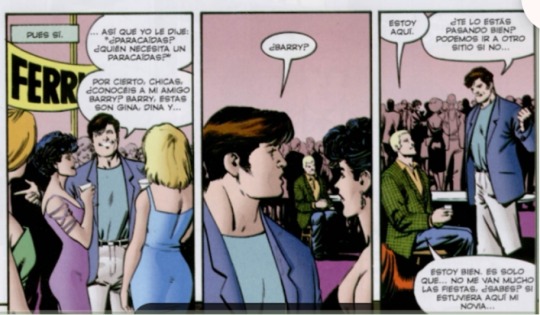
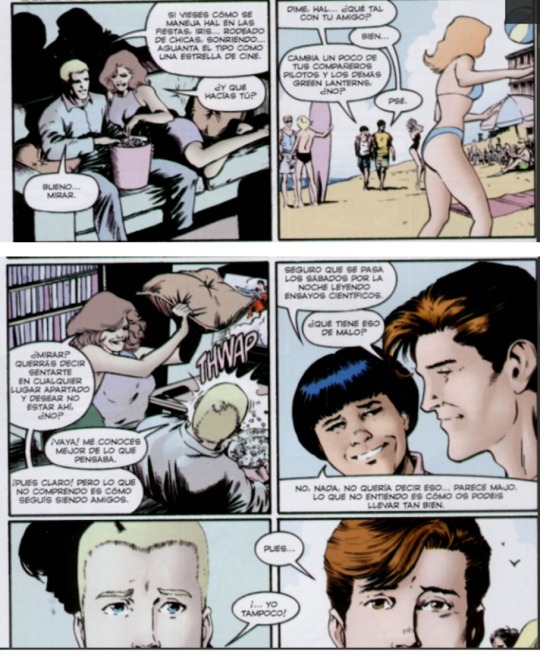
(Personally this panel is one of my favorites, as I love how Hal immediately jumps up to Barry's tastes, making it clear that while he doesn't like to do the same things Barry does, he doesn't find it as bad or boring as some might think.)
In general, the series of “The brave and the bold” I like because it allows you to take a close look at their relationship and give us lots of interactions of them, allows us to see a little more of their real character and their friendship.
There is also the fact that in that series they constantly show how well they know each other Hal and Barry manage to combine their skills to help each other. They always take advantage of each other's ability to resolve conflicts, and even when they fight or argue, they resolve them quickly. Another of my favorite numbers is the last volume of the series, when Barry falls into a terrible and painful depression and Hal is the only one who supports him.
Literally Hal tries to have some stability in his life to let Barry stay with him, helps him like Barry has always helped him and says one of the phrases I love the most.
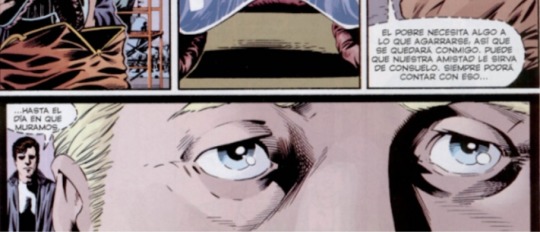
“The poor man needs something to hold on to, so he will stay with me, maybe our friendship will be a comfort to him, he will always be able to count on that until the day we die.”
In this same comic is where Barry tries to sacrifice himself and Hal stops him, to that I add that in a previous issue we also show that one of Hal's biggest fears is losing Barry. The thought of seeing him die or get hurt is something that scares him.
Hal's not afraid to die, he's afraid that Barry will die and it's his fault, that I can't save him. And that point added to everything that's going on with Parallax and Crisis on Infinite Earths feels like a stab for both of them.
It's fucking tragic.
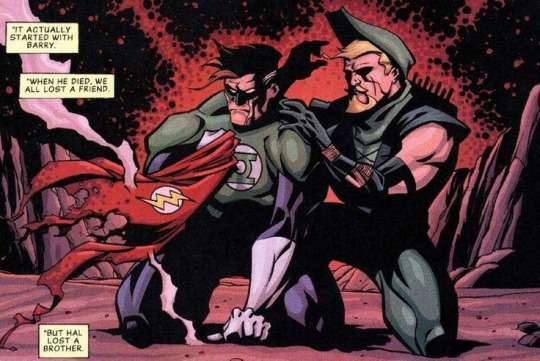
Generally in many moments of Hal as Parallax or The Wraith, Hal talks about Barry, continues to talk about how amazing he was as a person and a hero, talks about how he remains his best friend even though Barry is still dead. (That reminds me a lot of when I'm with my friends and some of them start talking about their boyfriends even though they're not there and we didn't talk about them originally)
And when they both revive, Barry constantly lets him know that everything that happened with Parallax wasn't him and tries to support him, try to be there for him for as long as he couldn't help him when his friend needed him the most.
We also have the fact that Barry has canonically been a blue lantern, and well, hope and willpower isn't exactly two opposing poles, on the contrary, it's likely that both entities are reciprocal forces. That they stick together and support each other, just like Hal and Barry do.
I also like to think that they had a somewhat similar childhood.
Both lost a father or mother, and that led to the loss of the rest of their family and childhood, they had to grow up faster than the other children, became more independent, and soon discovered that the world was cruel and unjust.
Although we also have other universes like:
The universe of Injustice where the two of them continue to support each other and remain together despite the mess that is around them, and there is even a panel where Hal as a yellow lantern is going to rescue Barry after Constantine abducted him.
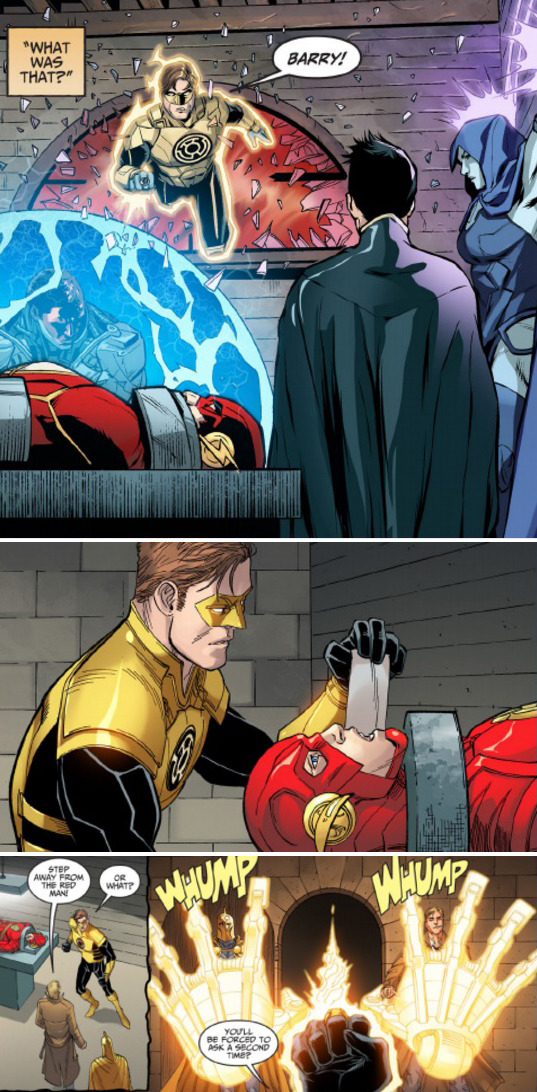
Or we also have the fact that red and green in the chromatic circle are two opposite or complementary colors that are usually used when you want to create a harmony on a visual level. That is, from the choice of colors we can know perfectly well that they are opposite poles, but they complement each other so well that it creates a visual harmony when you see them together. (For some reason Christmas usually uses these two colors as its main ones).
There's also the fact that Hal and Barry met before the league was formed, and even when they met Batman and Superman, Hal wanted him and Barry to work it out on their own. (Barry refused because someone has to put prudence on their duo)

And we have the fact that in the story of how they met, Hal calls it his “first date”. (Let's pretend he didn't say that when he and Barry weren't literally on what looked like a date, where they went to dinner at a restaurant where there was live jazz music and Hal actually had a good time sitting on Barry's cell phone).
(Hal hates jazz, but he's still there with Barry at a dinner party while putting up with music he doesn't really like. That's pretty.)
I think it was also in this comic where Hal lets Barry use his ring to get you both out of there.
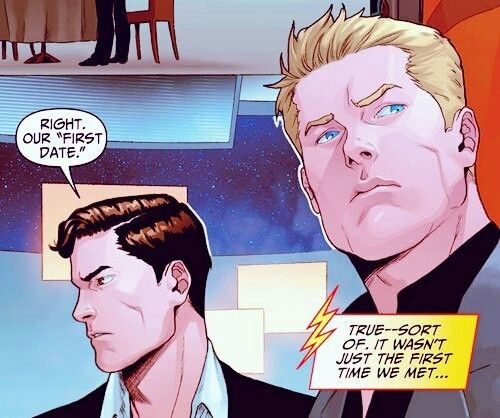

There's also universe 36 where we have two variants of Green Lantern and Flash that canonically speaking are couple. It is worth remembering that the two of them did not stay together, since in an event they participated in, the Flash of their universe dies. (It seems there can't be a crisis without a sprinter dying) Luckily at DC Pride they made the green lantern of their land look for their Flash, and they revived and were happy.
(They're supposed to be neither Hal nor Barry, but the truth, their designs and even their names feel like very inspired by them, so I scored it as a little extra point although I don't know if you can consider it).
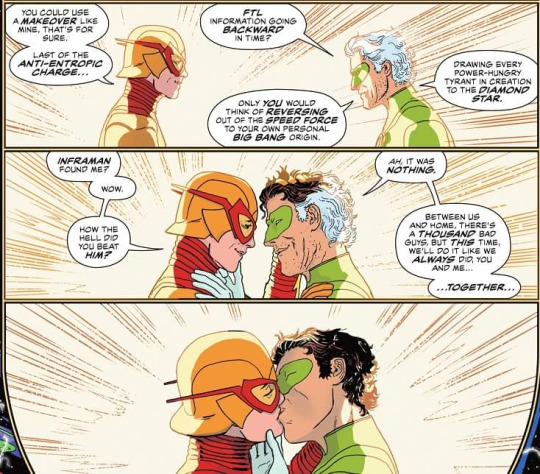
We have DC vampires that although in that universe, Hal kills Barry because they won't let him turn him into a vampire because he would end up killing everybody. Hal finally gives us that line where he admits that he REALLY wanted to conquer the world with Barry, which kind of fuels his tragic gay romance.
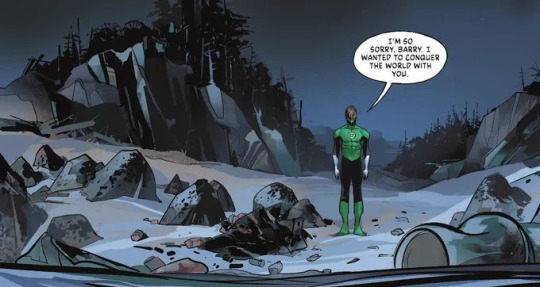
Anyway, I would like to go longer, but I can't find some panels that I was looking for to explain me more, plus I feel that this is already long enough and meaningless to make it clear that I love them both. I just want to add that I think probably the thing I like most about them is that they both admire each other. Both their heroic parts and their civilian parts, and I think that's very sweet and nice, added to the fact that they're always there trying to support each other or show off parts of their personality that you can't appreciate with all their friends to the same extent. I like that they always have symbolism and like many times in the comics it refers to some moments that they have lived together. This makes me have the theory in my head that maybe some cartoonists and writers also like them in a sense beyond friendship, but since NOBODY dares to take the leap of faith and make them canon, they let us drop some crumbs so as not to lose faith.
(If anyone got here, thank you so much for reading all this even though it doesn't make much sense in some parts, I apologize for that and make up for it with some panels of them two)
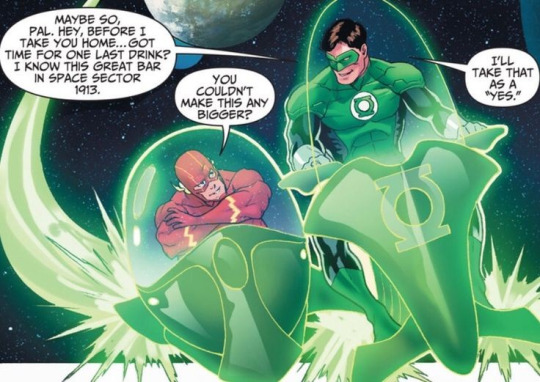

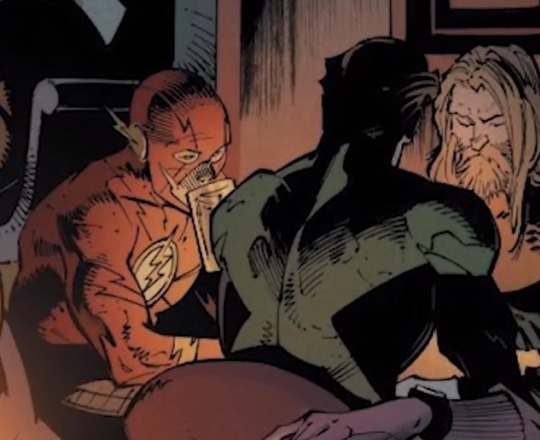
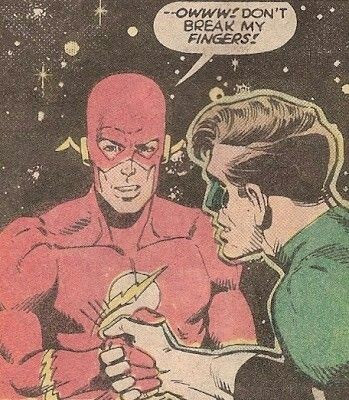
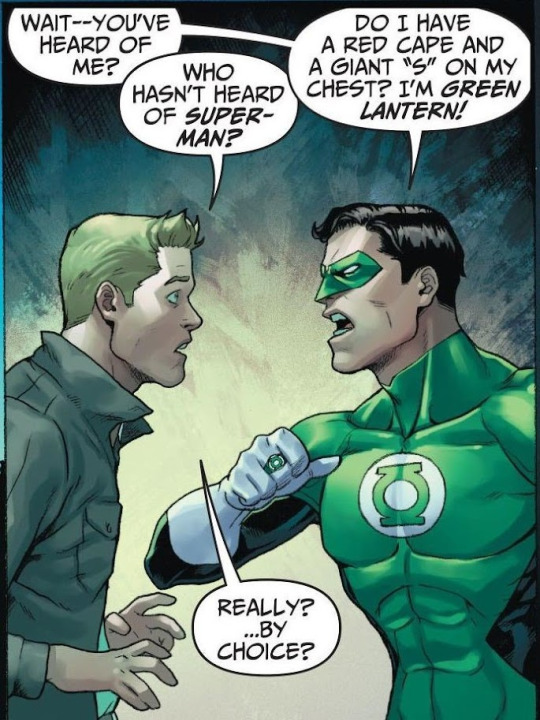

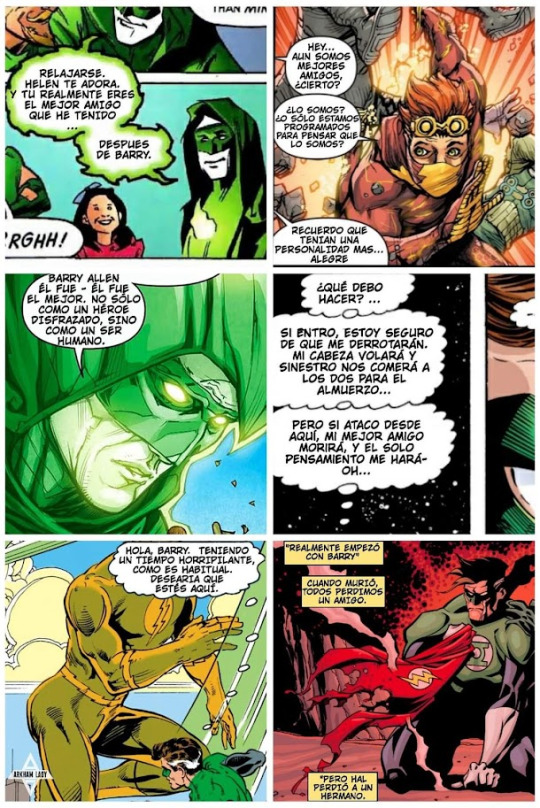
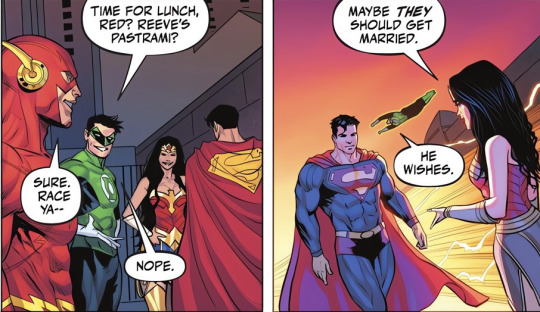
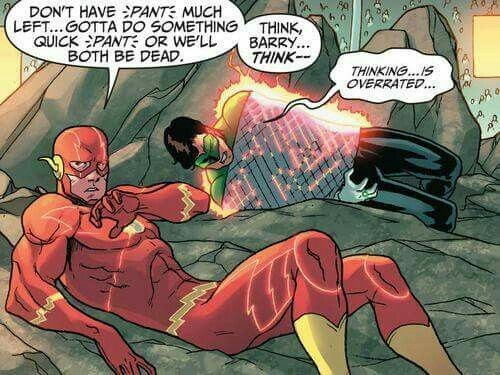



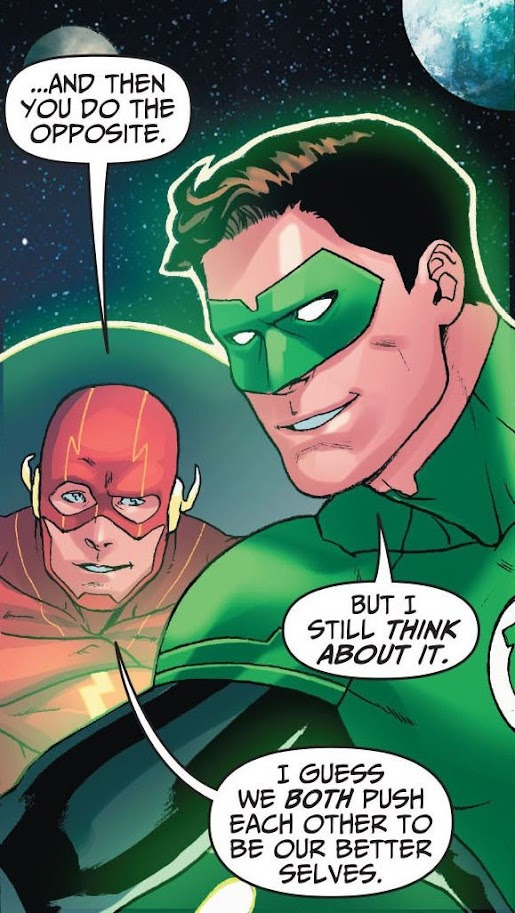
#hal jordan#barry allen#green lantern#dc comics#halbarry#i love them#sorry for the bad English#Mentions to 80s comics#Mentions of parallax and some comic book or comic book events#sorry if this doesn't make sense in some parts#but my brain has been a little fuzzy lately and I'm having a hard time thinking clearly.#but I really wanted to answer the question because I am very excited to talk about them.#maybe later I will take up some of the ideas I mention or redo this post with more clarity and detail.
119 notes
·
View notes
Text
are we as a Community ready to have the conversation about how She is just a giant dumb bitch in general, re: stuff 0% connected to gymnastics ? like shes basically the undisputed goat as far has athletic performance goes but as a person god fucking damn she WORKS to undermine it all lmfaooooo
#shes the quintessential pick me#im not digging into all her baggage and trauma bc all gymnasts have it even post nassar#and/or never interacted with nassar. etc etc etc. its a toxic sport and thats inevitable at the highest levels u cant pin it on him#we are all very ready to have these discussions about beijing girlies and even increasingly ready about london girls#some who are not on twitter and just Poast on here are even brave enough to talk about suni and jordan#simone escapes in these Sessions every time it seems. and i get why dgmr but like. lmfao.
58 notes
·
View notes
Text
It's Mermay and I saw so many things on Tumblr AND Twitter...especially two posts that influenced me in actually making a mermay post for DC...so I must introduce you to The Little Mermaid but Halbarry....(I have 2 more wips of this but here is part 1!!)
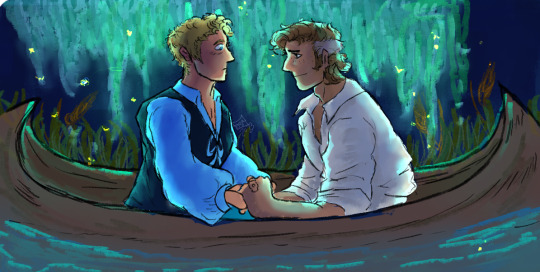


Eel Barry looking at Human Hal VERY fondly
#okay but these two for the song 'one step closer' from the broadway version...like..#I actually wanted to make Ollie scuttle in the one with Barry looking at Hal#But at the same time I want him to be Sebastian supporting the two with his best singing impression of 'kiss the girl'#speedster ramble#ERMMMM#this is the most biggest pieces ive done in awhile that isn't on ibispaint#this is me exploring clipstudio#halbarry#YES the halbarry post#I ACTUALLY ADORE THESE DRAWINGS I MADE LIKE IM SCREAMING#also Hal wearing a little ponytail....in the other picture...#hal jordan#barry allen#dc comics#green lantern#the flash#ERRRR#my art#im talking to the halbarry fandom and speaking very carefully about this#who would be ursula and flounder though (sob)#Barry fell first but Hal fell harder#dc#KISS THE MAN...#mermay#me doing a monthly art trend(?) no way...#actually my first mermay ever#btw Barry is an eel...and yes he still has his bolt scarring
290 notes
·
View notes
Text
The thing is that the beat about Nandor and Guillermo working together.. it feels unearned. But when I think about it, it should feel earned, with everything that's happened beforehand. The writers have done the work... but they've also undone the work. Unraveled their relationship. And now Nandor wants them to be a mutually respectful crimefighting duo? It doesn't feel quite there, imo.
That all being said, I do love it. This is almost exactly what I wanted... last season or the season before. But I'll take it now :)
#wwdits#open to people disagreeing#because like . ok it does make sense in some level. even after their character beat of 'yeah we have moved on from each other'#that was there and solid. but yknow. they are messy people. did they really mean it? maybe they did at the time but don't mean it anymore#now that they've found a new common enemy in Jordan#ok i REALLY liked the 'you're not like other people' part because yes! guillermo was NEVER going to be happy#welllllll ok that's also sort of not true he was happy when he thought he was valued at work and part of the group#but this is Guillermo we are talking about.#(i also really liked the 'you are a warrior' part <3)#ok gotta stop here or i will ramble forever
9 notes
·
View notes
Text
what if in tomorrow's backstage video we get a confirmation that bojan thought nace and jan kissed on stage and they all keep making jokes about it in the most deadpan tone (again). what then
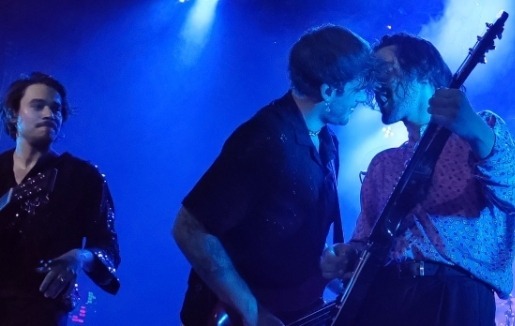
#i'm actually considering this because they are bastards enough to a) talk about it b) get it on camera and c) put it in the backstage vlog#i'm so unprepared for tomorrow's video#i feel like *anything* can happen here#btw what time are those vlogs usually posted?#there is a huge chance i won't be able to watch it immediately and it bugs me so much 😔🥀#joker out#bojan cvjetićanin#nace jordan#jan peteh#jance#janace
65 notes
·
View notes